

Educators,

The chilling story of a father and son murdered on 7/10 See page 6 Gemma Levine’s life in pictures P24









The chilling story of a father and son murdered on 7/10 See page 6 Gemma Levine’s life in pictures P24







Labour launched a final charm o ensive on Jewish voters in Barnet this week ahead of the election, in an attempt to “seal the deal” with those still harbouring doubts over Keir Starmer, writes Lee Harpin.
Party chiefs have been boosted by opinion polls suggesting the three socalled “Bagel Belt” seats in the borough – Finchley and Golders Green, Hendon and Chipping Barnet – could all turn red on 4 July.
Sources close to Starmer told Jewish News that Barnet holds a “special place in his heart” because of his pledge when


becoming leader to root out antisemitism and make the party attractive again for Jewish voters, many of whom live in the borough.
A survey of the Jewish community, conducted by the respected polling firm Survation for the Jewish Chronicle, also confirmed a dramatic rise in support for Starmer’s party - which has risen from the all-time low of just nine percent in 2019 under Jeremy Corbyn to 33 percent today.
But Jewish News understands there is still concern among Labour campaign Continued on page 2
Continued from page 1
chiefs about the effect of a succession of positive polls for the party on turnout.
A senior party figure also admitted to Jewish News: “The idea that all three of the Barnet seats are already in the bag is the stuff of fiction.
“Whatever happens elsewhere in the country on election night, we recognise that the results in Finchley and Golders Green, Hendon and Chipping Barnet are all likely to be close. History tells us these seats have always produced close results in elections.
“That’s why we are not taking any votes, including those in the Jewish community, for granted.”
Last week’s Labour manifesto launch also saw some in the community raise fresh concern about policy on recognition of a Palestinian state, as part of an ongoing peace process.
In a new attempt to maximise every possible Jewish vote for the party in the so-called bagel belt, senior Jewish Labour figures, including Dame Louise Ellman and Luciana Berger, have joined campaign teams across the borough.

In the three bagel belt seats, Finchley and Golders Green has a 21 percent Jewish electorate, Hertsmere 17 per cent, while Hendon has 15.1 per cent voters from the community.
A leaflet signed by Ellman, Berger, Dame Margaret Hodge and Baroness Anderson (Ruth Smeeth) has been distributed to Jewish voters.
Clearly aimed at voters from the community, it notes the rise in antisemitism following the 7 October Hamas attacks and calls for the release of the hostages and an end to the war with Hamas.
It then says: “We are proud to be Jewish. That’s why we were leaders in the struggle against antisemitism in
The Reform UK candidate for Hampstead and Highgate has defended the party against claims it has allowed far-right fanatics to stand at the general election, writes Lee Harpin.
Catherine Becker, who is Jewish, said the reality is the party led by Nigel Farage was now the “most supportive” towards the community.
She said that under the leadership of Richard Tice, now Reform UK’s chairman, the party had been quick to condemn the “unfairness” of what she claimed has been “two-tiered policing” of proPalestine marches after 7 October, where police would “turn a blind eye to Muslims, but stop a chap with a kippah and say ‘you can’t be here’”.
Becker told Jewish News there had been “a lot of misconception” in the community that Reform was a party for “racists”. Asked to comment on reports exposing one Reform candidate who said Britain would have been better off accepting an offer of neutrality from Adolf Hitler ahead

and another in which a separate candidate had described Hitler as “brilliant” although “evil”, Becker said there had been a “fast but quite thorough” selection process for candidates.
“What I would say is that if we [Reform] do find those outliers they act really quickly, and decisively,” she added.
“What’s nice is that they have a really streamlined view. Richard looks at it, and if they’ve done something racist or untoward, then they are out
“I think you will find that with Labour and the Conservatives, they take ages.”
Defending the comments
about neutrality and Hitler, made by Ian Gribbin, standing for Reform in Bexhill & Battle, in East Sussex, Becker said: “The guy was actually mortified, his grandmother was actually stuck in the gulags in Russia. It was completely not his views.
“Apparently he was speaking to an intellectual journal and was asked for his views on how, if this happened, people would act.”
Becker said she had never experienced any antisemitism in Reform. “In terms of my experience they have been very supportive of Jewish candidates, there’s a number around the country.”
The Reform manifesto, launched this week, promised a ban on Sharia Law in the UK.
Also standing in Hampstead and Highgate are Labour’s Tulip Siddiq, Don Williams for the Conservatives, Scott Emery for the Lib Dems, Lorna Russell for the Greens, Christie Elan-Cane for Rejoin EU, and independent Jonathan Livingstone.
the Labour Party. We confronted and defeated the racists and purveyors of hate. We are proud that under Keir Starmer Labour has changed for good.”
Jewish News understands there could also be further visits from highprofile Labour figures to Barnet in the final days of the campaign.
Teams of activists, many from the Jewish Labour Movement, have tried to engage with voters raising concerns about issues, including proposals around Israel and the Palestinians.
Local Conservatives have been keen to spread claims that Labour is planning to “unilaterally” recognise Palestine, without any obvious commitment on the ground for a two-state solution.
Labour has sought to counter this argument, saying its manifesto commitment closely resembles that of proposals made by foreign secretary David Cameron in January.
Keir Starmer told Jewish News this month that Palestine recognition would only be considered when a “safe and secure Israel” was assured.
In Chipping Barnet, the Conserva-
tives have held the seat ever since it was created in 1974. The Tory candidate this time around, Theresa Villiers, has been elected there since 2005. For Labour, Dan Tomlinson is seeking to overturn a 1,212 majority.
In Finchley and Golders Green the Conservatives have held the seat since 2010, under Mike Freer, who said he was stepping down ahead of this election due to security concerns.
Alex Deane is the Tory candidate, with Sarah Sackman seeking to overturn a 6,595 majority for the Tories in 2019.
Reports last weekend suggested Labour’s hopes of taking the seat could be boosted by the return of around 2000 students to the constituency following the end of the academic term.
In Hendon, the Conservatives have again held the seat since 2010, with Matthew Offord stepping down as MP ahead of this election.
A new poll published yesterday confirmed that support for Labour in the community now stands at 33 percent, with 42 percent saying they will vote Conservative.
‘CALL ME AN ANTISEMITE?’
Labour’s Lisa Nandy has told Green Party election candidate Jo Bird: “It is perfectly possible to stand up for the Palestinian cause without straying into antisemitism”, writes Lee Harpin. Appearing on the BBC’s Politics North West show, Labour’s candidate in Wigan was asked if she was concerned about the impact the conflict in Gaza would have on her party’s vote on 4 July in constituencies with big Muslim populations. Bird, Green candidate in Birkenhead after being expelled by Labour, claimed on the show that “people stop me on the street” to ask about her party’s position on Gaza. She then claimed Keir Starmer’s party was responsible for “expelling Jews like me for speaking up about the racism we face, and for criticising Israel”.

Nandy responded: “First of all, we make absolutely no apology for expelling antisemites from the Labour Party.” Bird responded: “Are you calling me an antisemite?”
She added: “I have stood up for the Palestinian cause for over a decade and during that time I’ve found it perfectly possible to do that without straying into antisemitism. Anyone who can’t do that is not welcome in Labour.”
A Labour candidate suspended over pro-Russia posts appearing to play down the country’s role in the Salisbury poisonings also shared claims that “right-wing Jews” in the Party had targeted Jeremy Corbyn, writes Lee Harpin.
Andy Brown was disowned by the party in Aberdeenshire North and Moray East after reports he shared an article from Russian state media outlet RT which claimed the “toxin” used in the poisonings was “never produced in Russia,
but was in service in the US, UK and other Nato states”.
But according to the Press and Journal, in the same month Brown also shared a quote from a historian which said: “The real issue… is that right-wing Jews in the Labour Party and outside the party object to the fact that Jeremy Corbyn is a consistent supporter of Palestinian rights.”
Speaking to Sky News yesterday, shadow chancellor Rachel Reeves said: “As soon as these postings came to light,
we got rid of him. People who don’t share our values in the changed Labour Party are kicked out of the Labour Party, while the Conservative Party continues to harbour people like Liz Truss, who has caused so much damage to the lives of working people up and down the country.”
Despite being suspended Brown will still appear on the ballot paper due to the deadline for nominations having passed, but he will not receive the backing of Labour.
Benjamin Netanyahu has finally invited relatives of hostages killed in Gaza to a meeting at his home, writes Lee Harpin.
Sharon Sharabi, whose brothers Yossi and Eli were taken captive from Kibbutz Be’eri on 7 October, confirmed to the AFP news agency: “I was invited to meet the prime minister.”
But a family member of a hostage who died in captivity also told AFP on condition of anonymity that she had declined the invitation, adding: “He remembered a little late to invite us.”

Some of the dead captives’ families have been outspoken in their criticism previously accusing Netanyahu of a lack of empathy toward them.
In contrast he had rushed to meet with the four hostages – Noa Argamani, 26, Almog Meir Jan, 21, Andrey Kozlov, 27, and Shlomi Ziv, 41 – who were rescued in a daring military operation in Gaza earlier this month.
The Israeli prime minister was due to meet some of the mourning families today and another group on Sunday, a spokesperson for the relatives said.
Families of hostages killed whose bodies were returned to Israel and those whose bodies remain in Gaza are among those invited.
Meanwhile, tensions have increased sharply between Israel and the United States after Netanyahu claimed weapons were being withheld from his country’s offensive in southern Gaza.
In a video Netanyahu appeared to directly criticise US president Joe Biden over what he claimed were “bottlenecks” in arms transfers.
A report in the Wall Street Journal claimed
the the White House has not moved ahead with the sale of 50 F-15 fighter jets despite Congressional support for such a move.
“It’s inconceivable that in the past few months, the administration has been withholding weapons and ammunition to Israel,” Netanyahu said in the video adding, “Give us the tools and we’ll finish the job a lot faster.
He accused the United States of effectively withholding arms for Israel’s war against the Iran-backed Hamas terror group in Gaza.
The White House reportedly cancelled high-level talks between American and Israeli security officials in Washington yesterday in response to Netanyahu’s video.
The Israeli PM also claimed US secretary of state Antony Blinken, in a recent visit to Israel, had said he was working around the clock to end the arms delays.
Blinken said on Tuesday that the only delay was in the supply of heavy bombs since May with concerns continuing about Israel’s killing of civilians in Gaza.
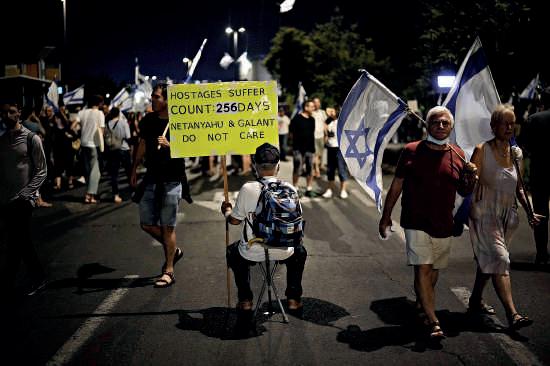
Responding to Netanyahu’s claims, a White House spokesperson added: “We generally do not know what he’s talking about. We just don’t.”
Blinken added: “We, as you know, are continuing to review one shipment that president Biden has talked about with regard to 2,000pound bombs because of our concerns about their use in a densely populated area like Rafah.
“That remains under review. But everything else is moving as it normally would.”
The row came as Israel’s general had reportedly signed off on planning for an offensive into Lebanon.
Tensions escalated after the release of video footage from a Hezbollah surveillance drone’s
Benjamin Netanyahu this week dissolved the Israeli war cabinet overseeing the conflict in with Hamas in Gaza in a move aimed at increasing his grip on decision-making.
The Israeli prime minister announced the move to ministers on Monday following the resignation from the cabinet by Benny Gantz.
Without Gantz – who with his National Unity party had joined an emergency coalition after the 7 October attacks – Netanyahu argued that the war cabinet was no longer needed.
The prime minister is now expected to discuss future military activity with a small group of ministers, including defence minister Yoav Gallant and strategic affairs minister Ron Dermer.
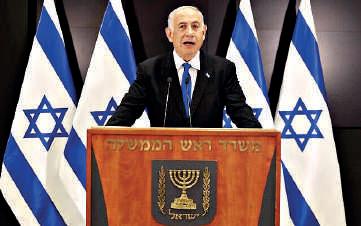
Reports from Israel suggest that by dissolving the war cabinet Netanyahu has sidelined far-right figures and there will be no initial involvement in the discussions for national security minister Itamar Ben-Gvir.
There are also claims that
Netanyahu has the military have clashed over major issues recently. On Sunday reports said he had criticised plans announced by the military to hold daily tactical pauses in fighting along one of the main roads into Gaza to facilitate the delivery of aid.
The limited pause in Rafah was announced after talks with Egypt and pressure from the United States to increase the flow of humanitarian aid into Gaza.
The IDF said the pause was being coordinated with the UN and international aid agencies.
Israeli television later quoted Netanyahu as criticising the military, saying: “We have a country with an army, not an army with a country.”
It was also reported on Sunday that Netanyahu told the regular meeting of the full cabinet that “in order to reach the goal of eliminating the capabilities of Hamas” decisions were made “that were not always acceptable to the military echelon”.
flight over Haifa, which included images of sensitive sites and civilian neighbourhoods. The broadcast of the footage was widely interpreted as a thinly-veiled threat against Haifa.
Foreign Minister Israel Katz said in a post on X: “We are getting very close to the moment of deciding on changing the rules of the game against Hezbollah and Lebanon.
“In an all-out war, Hezbollah will be destroyed and Lebanon will be severely beaten.”
Israel’s military later said that “operational plans for an offensive in Lebanon were approved and validated and decisions were taken on the continuation of increasing the readiness of troops in the field”.
Election fever has started to grip the community with impressive attendances at hustings staged this week at schools and synagogues.
More than 200 people attended a lively event at Borehamwood Synagogue on Tuesday, featuring deputy prime minister Oliver Dowden and Labour candidate Josh Tapper, along with a Liberal Democrat representative.
While at JCoSS school, 150 people registered to attend a Chipping Barnet hustings on the same night, which featured Conservative candidate Theresa Villiers and Labour’s Dan Tomlinson, again with the Lib Dem’s Mark Durrant.
The high attendances seemed to confirm plenty of
interest within the community over the result of next month’s election, with opinion polls continuing to show Labour in a commanding lead over the Conservatives.
While Israel, in the aftermath of 7 October remains an obvious topic of discussion, hustings have also shown the community has major concern about issues such as housing, the state of the roads and pavements, along with worries about the impact of pollution and of sewage leaks.
Villiers has attempted to suggest Labour favoured “unilateral” recognition of Palestine, despite the party’s manifesto stressing it would only back recognition as a part of an international process.

lee@jewishnews.co.uk
@lmharpin
Theresa Villiers, Conservative MP for Chipping Barnet since 2005, is the only candidate who has served as a minister in various governments. She is also the sole one among Barnet’s three Conservative MPs to contest this election, with Mike Freer and Matthew Offord both having opted to stand down.
Vllliers, a former barrister, told Jewish News she is running again “because I love Barnet. I care about the issues that the community here worries about — I want to try and fix them, make them better. I feel I’ve got more to contribute on issues such as the NHS and schools”.
The Conservative candidate has six opponents in the 2024 race: Dan Tomlinson for Labour, Kay Lauer, Independent, David Farbey for the Greens, Mark Durrant for the LibDems, Richard Hewison for Rejoin the EU, and Hamish Haddow for Reform UK, a candidate dropped by local Conservatives in 2022 for posting o ensive tweets.
Villiers has not had an easy time holding on to her seat. In 2017, she beat Labour’s Emma Whysall by just 353 votes, increasing her majority over Whysall in 2019 to 1,212. This time, the former secretary of state for Northern Ireland and former secretary of state for the environment faces a di erent Labour candidate in Dan Tomlinson.
“It’s a tight race,” Villiers admits. “I am campaigning energetically and enthusiastically and I think my record stands me in good stead. My platform is about protecting our green spaces, and Labour wants to build over the Green Belt — I’m very worried about that.
“I feel we should safeguard our suburban environment and not build tower blocks; I would like us to keep our local police station,
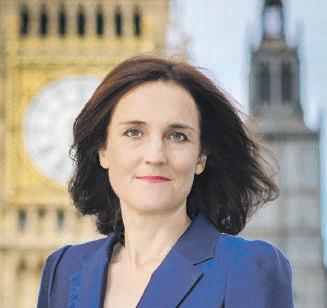
but Labour and Sadiq Khan want to shut it down.” (Opponent Tomlinson says while Villiers is indeed running a campaign to re-open the police station, “she voted for every single Conservative budget that cut the policing in London”.)
Villiers says she believes a Labour MP would “be on the side of” Khan on car issues”.
“Whatever happens nationally, people need to know who is going to be fighting for them locally,” Villiers says — which rather suggests she buys in to Grant Shapps’ view that there could be a Labour “supermajority” at this election.
She adds, realistically: “With these poll figures, I don’t think anyone is taking anything for granted.”
A Conservative Friends of Israel vice-chair, Villiers has been a familiar figure at community events, speaking out against antisemitism and most recently visiting one of the southern kibbutzim where the Hamas October attacks took place.
Her immediate Labour opponent in this election is economist and local councillor Dan Tomlinson, who predicts a close contest: “This constituency has never been
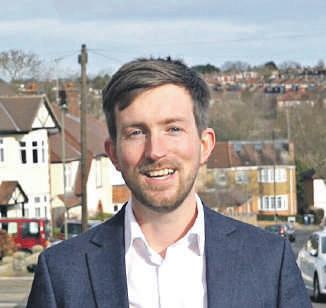
Labour before, the other two Barnet constituencies went to Labour in 1997 and Chipping Barnet didn’t. I do feel cautiously optimistic, that across the constituency, which I live in, people want to vote for change.”
He says the newest boundary changes a ect Villiers’ majority by pushing it up “to around 5,000 votes. The Labour party locally have been trying to close the gap, but there is a bigger climb ahead of us than people might think”.
This means Tomlinson, who, with his wife, has a 13-week-old son is also campaigning as hard as he can. He is aware that “one in 10 voters” in Chipping Barnet are Jewish and he is grappling with issues which matter to them, acknowledging: “I have to build trust.”
He has visited schools in the constituency assiduously, including JCoss, and says he “stands with Israel, its right to defend itself and to exist”. He has also visited Israel under the auspices of Labour Friends of Israel. Gaza comes up on the doorstep with voters, he says — “but the biggest challenge for me is people don’t know me so well yet.”
The sole Jewish candidate running in Chipping Barnet is David
Farbey for the Green Party. He was selected as the party’s parliamentary candidate for the 2019 election but was unwell, so had to withdraw — which means this is his first parliamentary run.
Farbey is bullish about recent stories relating to allegations of antisemitism in the Green Party, telling JN the Green leadership had had recent productive discussions with the government antisemitism czar, Lord Mann.
He says: “We are having a rather low-key campaign in Barnet for the general election. But when we campaigned here for the London elections, that [antisemitism] was not an issue anyone raised with us.
“Yes, there have been cases of statements made by some Green Party candidates, and some of those people have been stood down and are no longer candidates.
“But I don’t think there is anything like as much of a problem in the Green Party today as there was in the Labour Party under Corbyn. There hasn’t been a Green representative who has needed a police escort to attend a Green event, which is what happened in Labour under Corbyn.
“So I think that comparisons made by some newspapers are disingenuous.”
He adds: “If the voters of Chipping Barnet elect me, I would do my very best to represent their best interests, and I think those align with the Green Party’s best interests.
“First, a move to renewable energy, support for the NHS, support for issues that a lot of Londoners are worried about — support for renters, for example.
“I don’t think the real needs of Chipping Barnet are much di erent from others across the country”.
On Gaza, Farbey says: “The Green Party was calling for a ceasefire from the beginning of this current conflict. The rest of the world is now catching up. I think a lot of people have been disappointed by the Labour Party not calling for a ceasefire. I think our position on Gaza has been well accepted and well supported.”
A semi-retired technical writer in the hi-tech industry, Farbey would like to take part in Jewish community hustings, but says he has not been invited to participate.
Andrew Gilbert of the London Jewish Forum, which co-ordinates the Jewish community hustings together with the Jewish Leadership Council and the Board of Deputies, said: “Our policy is to facilitate an opportunity for interaction with a broad spread of political opinion, and with candidates from those parties who have existing representation in the area, have sought and have a record of engagement with the Jewish community.
“Further taken into account is their performance in the previous elections and current polling.”
• Full list of election candidates: Liberal Democrats, Mark Durrant; Green, David Farbey; Reform UK, Hamish Haddow; Rejoin EU, Richard Hewison; Independent, Kay Lauer; Labour, Dan Tomlinson; Conservative, Theresa Villiers
Angela Rayner has rebu ed calls by the SNP’s Stephen Flynn for a possible Labour government to end arms sale to Israel.
Speaking during the latest ITV television debate, the Labour deputy leader committed her party to reviewing the legal advice over the UK arms sales question.
But she told the SNP man: “Stephen, you know as well as I do what happened on 7
October was barbaric and Israel had the right to defend itself.”
She then added: “However since then the absolute loss of thousands of innocent lives –everyone in the House of all political persuasions have been pushing for a ceasefire, as well as our international counterparts.”
Rayner continued: “If we were in government, we would immediately review, as we’ve
been asking the government, the legal advice to arms sales to Israel. And we will comply with international law.”
Earlier in the debate, Flynn told Rayner: “Angela, it took four and a half months, and the deaths or injury of almost 100,000 civilians in Gaza for the Labour Party to back a ceasefire. On day one of a Labour government, will you end arms sales to Israel?”
Rayner’s response was criticised by SNP former first minister Humza Yousaf, who posted on X/Twitter: “Stephen Flynn asks Labour if they will ban arms to Israel should they form the next government?
“Angela Rayner says a lot, but no confirmation they would ban arms sales to Israel. How many more children in Gaza have to be killed for Labour and Tories to do the right thing?”















Meryfield















Sponsored Bike Challenge
11.30am (suitable for ages 4 – 11)
£15 Registration (includes free entry to Carnival)

















Sabine Taasa’s eldest son Or was murdered by Hamas during the 7 October attack. Hours later, her hero husband took the full blast of a hand grenade to save Or’s two brothers. This is Sabine’s story, as told to Michelle Rosenberg
On the morning of 7 October, Sabine Taasa recorded a video on her phone, fearing Hamas terrorists were about to breach the family safe room in Netiv Haasara, less than a mile from Gaza.
The footage is almost too distressing to describe. On the bed, virtually unconscious, are two of her four sons, eight-year-old Shay and 12-year-old Koren, both covered in blood.
Shay has severe shrapnel wounds, with one eye nearly out of its socket. Sabine is crying in sheer terror. The floor is soaked in blood.
The two boys had rushed over from the neighbouring house, where their father Gil, a senior firefighter, had been hiding with them in a shelter. The terrorists, heavily armed and equipped with parachutes, had infiltrated their moshav with a map that included the names and details of everyone in the community.
Sabine said: “They knew that Gil was head of security and would be armed. Gil was a key target.”
As the terrorists threw a hand grenade into the shelter, Gil rushed forward to save his sons, taking its full explosive force to his stomach. The murderers checked he was dead, fired another bullet into his head, then calmly drank coke from the family fridge.
Speaking to Jewish News , Sabine said: “I have now three boys. I lost my husband and my eldest boy on 7 October.
“I don’t have time to be in pain or crying, because I need to take care of three children and my mission is to tell the world.”
The family home and moshav at Netiv Haasara is barely half a kilometre from Gaza. At 6am, Sabine and Gil’s eldest son, 17-year-old Or, left for his regular weekend walk on the beach.
Sabine said: “I was sleeping. He didn’t wake me. At 6.25am my other boy, Zohar, woke me and said, ‘Mama, hurry! Go with me to the safety room’.”
Zohar had heard unfamiliar sounds outside the house. Sabine

told him to close the doors and turn off the electricity. It was deathly quiet: “You could not hear the motors of the fridge. The water cooler was quiet.”
Desperate to reach Or, she took a chair, stood up and started to wave the phone above the window in an attempt to get a wi-fi connection. She managed to reach her son and asked where he was.
Sabine said: “I could hear in his voice how much he was afraid and terrified and alone. He said to me, ‘Mama, I’m here, don’t worry but something has happened. Something strange. It’s not a regular attack. It’s not a regular bomb. It’s something that we
never saw before. But don’t worry Mama. I’m here with Nadav (his best friend). We are not alone we are near to the safety place with two soldiers’.”
Sabine begged him to lie on the floor. He told her: “Mama I must go. Don’t worry. Don’t worry.”
Minutes after the call Or was murdered. Six bullets to his head. The terrorists had approached the beach by swimming and canoeing the 400 metres from Gaza.
Sabine said they “got out from the water in uniforms, carrying RPGs, grenades and camera GoPros. Everything was prepared for this moment and when they arrived on the sand they started to shoot everywhere.
“They shot children, women, fishermen and young people who had come that morning to the beach to enjoy life.”
Nineteen Israelis were murdered that morning at Zikim beach. Only one person survived, later recounting Or’s last minutes to Sabine as they hid in a toilet.
In the safe room with 15-yearold Zohar, Sabine heard Gil’s Glock handgun shooting at the terrorists. She heard voices in Arabic and 20 minutes later the sound of holes being drilled in the wall.
A neighbour tried to come to the rescue with a machete. “He was murdered, bleeding out for two

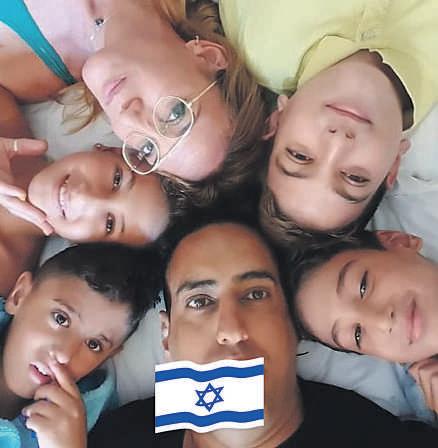
hours because we didn’t have help. No police. No ambulance. No IDF”. Eventually, she heard Shay and Koren outside calling for her. Going outside, despite her other son fearing it was a trap, Sabine saw “my two little boys, bleeding from the head to the feet. One had his eye out of his socket”.
They told her: “Daddy is dead. Why didn’t they kill me?”
Somehow she found the composure to carry them both to the safe room and eventually, soldiers arrived and took them to an armoured Jeep. Sabine rushed away to see Gil’s body for herself.
“I found my husband lying in the entrance of the shelter, with a lot of blood. He was lying like an angel. I took him and kissed him and cried. I asked him to wake up. He didn’t wake up.”
Now living in Netanya, Sabine said: “I am a refugee. I don’t have my life, my friends, my community. I lost everything and now I’m trying to get on with my life from the beginning. I don’t have time to think why it’s happened to me. This is not my mission. My mission is to take care of my
three boys and of me and tell the world what happened.”
Shay is now blind in one eye from his wounds.
Determined to “help him to find the best doctors in the world”, Sabine says it’s not just a physical problem, “it’s a moral and mental one. My boys are very confused. They are so alone. They don’t believe they will ever find happiness again.”
She says one reason she brought them to London was “to show them that life is not only terror. Real life is people who want to help us. Everyone wants to live in peace. We don’t want wars. I want to show them we have a future, that we have the possibility to continue life without terror.”
“My older son was my twin. Emotionally, we were the same. I cannot accept his death. I cannot go to the cemetery. I cannot look at the pictures because for me it’s as if he’s coming back. I feel Gil when I’m talking about him.”
Father and son Gil and Or Taasa were buried side by side on 18 October.

www.ivyhouseschool.co.uk
World Jewish Relief (WJR) is teaming up with a US-based organisation to provide aid to Gaza, writes Michelle Rosenberg.
The announcement was made on Sunday by Col Elad Goren, head of civil a airs at COGAT, the Israeli government agency responsible for humanitarian aid into the territory.
Goren emphasised the importance and necessity of Israel’s humanitarian approach, highlighting the o cial Israeli government policy is to increase humanitarian aid into Gaza through trusted partners – not because of international pressure but because these are the values of the state of Israel and the Jewish people.
WJR chief executive Paul Anticoni said it was encouragement and approval from COGAT and the Israel authorities that led to the decision to provide targeted support to a partner in Gaza, to deliver lifesaving maternal and infant healthcare to mothers and babies.
WJR will work alongside International Medical Corps (IMC), a US-based global

humanitarian responder.
After the 7 October attacks, IMC worked to deliver support to Israelis through the JDC, and to Palestinians in Gaza with the support of COGAT.
IMC makes a point of vetting and hiring all its sta , and does not use Gaza Ministry of Health sta in its field hospitals.
The organisation also does not treat armed combatants

ment to supporting the people of Israel after the horrific events of 7 October.
While not having worked with partners in the country for more than two decades, the WJR board decided quickly to direct support to partners that closely aligned to its areas of expertise.


and all sta on the ground must go through a level of security checks to meet US funding requirements.

Funding for the new venture has been provided by a small number of private donors specifically for this purpose.
Anticoni also described the organisation’s ongoing commit-
This support is now being extended to ensure the Israel Trauma Coalition can continue to provide essential psychological and trauma support to all Israelis in the aftermath of 7 October.
Anticoni said:
“For the past 91 years, WJR has stood proudly shoulder to shoulder with communities in crisis across the world.
“We have taken a careful and considered approach to this decision, which we hope our supporters will recognise, and we are proud to be working with Israel to help the country we love advance its interests.”
An inspiring 102-year-old Holocaust survivor has followed Cindy Crawford and Kate Moss in gracing the cover of fashion bible Vogue magazine.
Margot Friedländer, born Anni Margot Bendheim in Berlin in 1921, has dedicated her life to Holocaust education through a charitable foundation established in her name. Her entire family was murdered at Auschwitz.
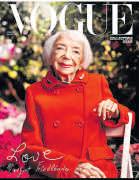
She has been chosen as the cover star of German Vogue’s July/August issue.
Margot married Adolf Friedländer after the war and moved to New York, returning to Berlin at the age of 88 after his death in 1997.
Journalist Miriam Amro, who interviewed Margot, said: “She still remembers exactly how it all started. That’s why she wants to speak. On behalf of the victims who can no longer speak.”
Margot’s mother surrendered voluntarily to the Nazis when her younger brother was taken away. Left behind, Margot went into hiding, had her nose operated on because she looked “too Jewish”, dyed her hair red and wore a cross necklace to “Aryanise” herself.
Despite this, she was discovered by Jewish ‘captors’ in 1944 who betrayed her to the SS and Margot was deported to the Theresienstadt concentration camp.
Barclays has suspended sponsorship of Live Nation festivals in response to a boycott of concerts by artists protesting about its alleged ties to defence companies supplying Israel, writes Adam Decker.
A spokesperson for the bank confirmed: “Barclays was asked and has agreed to suspend participation in the remaining Live Nation festivals in 2024.”
The move a ects major events like Download, Latitude and the Isle of Wight Festival. Barclays signed a fiveyear sponsorship deal with Live Nation in 2023, but it’s not clear if the suspension will apply to all events up to 2028.
Comedians Joanne McNally, Sophie Duker, Grace Campbell and Alexandra Haddow all announced they would be boycotting Latitude Festival last week.
Musicians including CMAT, Pillow Queens, Mui Zyu and Georgia Ruth had also pulled out of the event.
BBC presenter Liz Kershaw was among those to condemn the impact of the antiIsrael boycott campaign, posting on X/ Twitter: “Now our entertainment is under attack. No sponsor = no festival. Bullying of bands = no festival. This is really sinister and is potentially devastating for musicians, music lovers and our culture.’

A Live Nation spokesperson said: “Following discussion with artists, we have agreed with Barclays they will step back from sponsorship of our festivals.”
Tom Morello, guitarist for Rage Against The Machine, which will play at Download, said: “The fact that the festival has listened to its musicians and cut ties with Barclays Bank is a testament to the power of artists taking collective action for human rights.
“I’ve been pushing hard for this behind the scenes and I salute all the artists who have taken a stand to help make this historic withdrawal happen.”
Campaign group Bands Boycott Barclays, which has been leading the protests, said 163 acts, four showcases and two venues previously pulled out of the Barclaycard-sponsored Great Escape festival in Brighton in May.
Following Live Nation’s announcement last Friday, the protest group wrote on Instagram: “This is a victory for the Palestinian-led global BDS (Boycott, Divestment, Sanctions) movement.
“As musicians, we were horrified that our music festivals were partnered with Barclays, who are complicit in the genocide in Gaza through investment, loans and underwriting of arms companies supplying the Israeli military.
“Hundreds of artists have taken action this summer to make it clear that this is morally reprehensible, and we are glad we have been heard.
“Our demand to Barclays is simple: divest from the genocide, or face further boycotts. Boycotting Barclays, also Europe’s primary funder of fossil fuels, is the minimum we can do to call for change.”
Barclays has been targeted by proPalestine campaigners in recent months, with protesters smashing windows and throwing paint over the bank’s branches.
A man in his 40s has been arrested after an attempted assault and kidnap of a 12-year-old Orthodox boy and his twoyear-old sibling in Stamford Hill.

The incident at midday on 13 June took place outside Lubavitch House Synagogue and was captured on CCTV.
The young boy, part of the Charedi community, was walking past the synagogue pushing his sibling in a buggy when he was approached by a white male suspect in his 40s, who attempted to take the buggy forcefully.
When the boy resisted, the suspect pulled his payos (side curls) and threw o his kippah. The boy’s cries for help alerted nearby individuals, the suspect released him and the young boy ran away in shock.
The suspect was appre-
hended by members of the Jewish community who were passing and detained him until police arrived and arrested him at the scene.
The Metropolitan Police in Hackney are now investigating and anyone with further information is encouraged to contact police or Shomrim quoting reference 01/446194/24.
More than 238 hate crimes within the Charedi Orthodox Stamford Hill community have been reported to Shomrim since 7 October.
For the latest updates, follow @Shomrim on X (Twitter)


020 8194 6194
info@myhousing.co.uk www.myhousing.co.uk
Experience a hassle-free renting process using My Housing's rent guarantee model, where personal service seamlessly intertwines with professional excellence.
Our dedicated team ensure that landlords receive unparalleled support, from rent guarantee solutions to meticulous property care
Client feedback
It’s really important to me that my properties are kept in good order, and I comply with the regulations. My Housing have made sure that this is the case. Louise, Landlady, 5 Properties

YOUR RENTAL INCOME GUARANTEED FOR UP TO 5 YEARS NO VOIDS. EVEN IF YOUR PROPERTY IS VACANT
NO MANAGEMENT FEES
YOUR PROPERTY RENTED WITHIN 48 HOURS POST INSPECTION ANY MALICIOUS DAMAGE COVERED YOUR RENT PAID ON TIME
Call us on 020 8194 6194 and quote ‘JN1’
The former chief executive of Maccabi GB, the late executive director of the Israel Guide Dog Centre UK and deputy chief executive of the Holocaust Memorial Day Trust were among those recognised in the King’s Birthday Honours list.
Martin Segal, the driving force behind the Israel Guide Dog Centre UK, was posthumously made an MBE. Proud wife Rebecca told Jewish News: “His son Natan and I are bursting with pride for the incredible achievements Martin made during his life and the wonderful legacy he leaves behind.
“He had so much to give and did so much good during his life, and all of the work he did will continue on. This is just such an incredibly well-deserved award. Another notch to add to Martin’s belt. Anybody who knew him well would know he would be revelling in this and quite rightly so!”
Segal’s passion for dogs was rivalled only by his commitment to Israel and he tried constantly to combine the two through fundraising, notably in 2019 when he cycled to Be’er Sheva for the Israel Guide Dog Centre. He tragically died from cancer in January.
Another Martin – Berliner, former chief executive of Maccabi GB – becomes an MBE for services to the Jewish community. He stepped down from the role after two decades in 2020.
Berliner said he was speechless on receiving the letter from the Cabinet Office: “I am overwhelmed by the honour awarded to me. My first thought was of my late parents, I so wish I could share this moment with them and to thank them for all their love and support.”
He added that he was delighted “the work Maccabi GB delivers every day to our community and beyond has been recognised in this way. The work the Maccabi movement does in Great Britain didn’t start with me and didn’t end with my retirement; long may the organisation continue to go from strength to strength.”
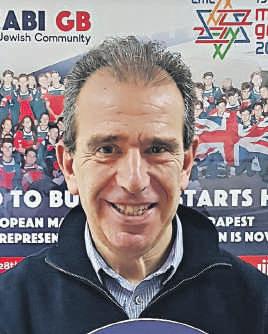

Berliner thanked the “presidents, vice presidents, chairs, trustees and large number of selfless volunteers I have served with for over 20 years both nationally and internationally” and added that the recognition is “for all of you and your tireless dedication to our communities both in Great Britain and across Europe where I am currently supporting the chairman and executive of Maccabi Europe.”
Myrna Miriam Bernard, who retired in January this year after 12 years as a social worker with the Association of Jewish Refugees (AJR), is made OBE for services to the Jewish community and the disabled in Scotland.

AJR chief executive officer Michael Newman said: “During her tenure with the AJR, Myrna was a devoted social worker and confidante and remains a compassionate advocate for our members. She is a remarkable stalwart of our community and we are thrilled she has been recognised for services to the Jewish community and to the disabled in Scotland.
“The AJR is proud of our 80-plus-year history in supporting Holocaust refugees and survivors, a privilege made possible by the vital support of dedicated social workers such as Myrna. Mazel tov!”
Dr Rachel Sarah Century, deputy chief exec-

utive of the Holocaust Memorial Day Trust (HMDT) is awarded an MBE for services to Holocaust education and commemoration.
She has a doctorate in Holocaust Studies from Royal Holloway, University of London and published a book, Female Administrators of the Third Reich, based on her research in 2017. She is also an educator for March of the Living UK and a Fellow of the Imperial War Museum in Holocaust Education.
HMDT chief executive Olivia MarksWoldman said: “I’m thrilled to hear Rachel has been awarded an MBE for services to Holocaust education. It’s a thoroughly deserved honour and a testament to her unwavering dedication to ensuring that the truth and historical accuracy of the Holocaust are kept alive.
“Her passion and commitment are truly inspiring, and her work with the Holocaust Memorial Day Trust and others plays a vital role in making sure we never forget the horrors of the past.” Marks-Woldman was awarded an OBE by the late Queen Elizabeth in 2020.
Novelist Hannah Mary Rothschild is made OBE for services to philanthropy in the arts, culture and charity sectors. A writer, documentary filmmaker, businesswoman and philanthropist, Rothschild is a non-executive director of RIT, the family investment trust.
In 2015, she was appointed the first female chair of the board of the National Gallery in London. She also chairs Yad Hanadiv, the Rothschild charitable foundation in Israel. She was awarded a CBE in 2018.
Long-time Camden Council leader Georgia Gould, currently standing as a Labour candidate for Parliament, is awarded an OBE for services to local government. Dame Jenny Abramsky, former BBC director of radio, has become a Knight Grand Cross Order of the British Empire, while acclaimed BBC broadcaster Alan Yentob becomes a CBE. • Editorial comment, page 16
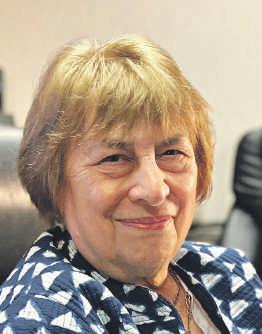
Hundreds of people have paid tribute to the United Synagogue’s head of burial Melvyn Hartog, who has died, aged 76.
Hartog spent more than 23 years advising bereaved families and wider society on Jewish burial. He died on Sunday following a short illness.
Chief Rabbi Sir Ephraim Mirvis described Hartog, who lived in Chigwell, Essex, as “one of the finest people I have ever known”. A statement said: “A warm-hearted, humorous and compassionate mensch, Melvyn’s selflessness and generosity of spirit knew no bounds.
“He brought comfort, reassurance and consolation to thousands of people and was an extraordinary beacon of light and inspiration to us all. ”
Michael Goldstein, president of the United Synagogue, said his colleague “always went

above and beyond to help in any way he could” and his death “leaves an irreplaceable gap”.
He added: “Melvyn was a larger-than-life character who put his heart and soul into helping families at the most di cult and delicate times of their life. He spoke to communities regularly about the work of the Burial Society through
a challenging session called ‘Talking about death won’t kill you’, to encourage loved ones to make arrangements should the worst happen. As a result, countless families were better prepared.”
The Board of Deputies called Hartog “a pivotal figure” who “made lasting change”.
It added: “Melvyn was a
pivotal figure in the community who made a profound impact on the lives of bereaved families with his sensitivity, diligence and thoughtfulness.
“His contribution to advising coroners about Jewish sensitivities and improving relations between the coroner service and Jewish community has made lasting change. He will be sorely missed by many.”
The Federation of Synagogues paid tribute to Hartog as “a man for all Jews” to whom many looked as “our elder statesman”.
It said: “He was in no way parochial; his advice, encouragement and support were available to colleagues in other communities.”
Hartog, who also volunteered as a Jewish chaplain at Wormwood Scrubs prison, leaves his wife, Marilyn, and two daughters, Laura and Deborah.



A blind Royal Navy veteran hopes to run 10k in London on Sunday for a British charity that helps injured Israeli soldiers.
Alan Lock, 44, from Shrewsbury, is part of the Maccabi GB Community Fun Run and Israel Festival on 23 June.
The former nuclear engineer will be accompanied by his running guide for the day, Beit Halochem project manager David Thrilling, and is raising funds for activities for the newly blind veterans who consider Beit Halochem their second home. The charity is supporting 7,500 new veterans injured since the 7 October terror attacks.
Lock joined the navy in 2002, but three years later, aged 24, lost his sight owing to a genetic condition. Forced to retire from the Armed Forces, he represented Blind Veterans UK at the Beit Halochem Veteran Games in Israel last year.








The practising Catholic and head of operations for a training company in London is an experienced runner.
“When I lost my sight, there were some sports I really miss,” he said. “Running was something that I could still do and I’m good at. I can do it with a guide and train on a running machine.” He estimates that he has done “around 14 or 15 London marathons”, as well as competitions in New York and Athens.
Thrilling says: “It is amazing that a UK veteran and former Royal Navy O cer is standing by the Jewish community at this time”
has expanded the
and hopes a new building will help it do even more
It has been 20 years since Rabbi Naftali Schi discovered that Aish UK, which he led and where he prayed, had been set alight.
He remembers walking to the building in Hendon on a Shabbat morning, to find a cordon around the site.
He learned it had taken three fire engines to extinguish the flames, and one police o cer pulled Rabbi Schi aside to inform him that there were Jewish artefacts that had been shredded and left at the scene.
Those artefacts turned out to be two Torah scrolls, which had been forcibly removed from the Ark and desecrated.
“They had ravaged the synagogue and ripped the Sifrei Torah,” Rabbi Schi recalls. “It was dismal.
“I remember crouching down and picking up two sides of a Sefer Torah,” he says. “As soon as I cradled them in my hands, I read the verses and as I rose up, I felt a tremendous surge of energy – I thought: ‘We are not going to allow ourselves to be defined as victims of antisemitism.’”
To this day, no one has been arrested in connection to the incident, which caused damage of about £250,000. But Rabbi Schi refused to dwell on the desecration.
Within a few days of the fire, his team moved into a temporary rented o ce in Golders Green to continue their work, and the remit has significantly expanded.
“We were not going to let anyone stop us,” he says, recalling a conversation at the time with the late Chief Rabbi, Lord (Jonathan) Sacks. “Rabbi Sacks said: ‘Your response has to be the traditional Jewish response to antisemitism. According to the level that they a ict us, we will expand. We will grow stronger and bigger than ever before.’”
And they did.
Now, as its founder and chief executive, Rabbi Schi heads Jewish Futures, a collection of 12 organisations working across the community, reaching 17,000 people, the majority of whom are 16- 30-year-olds. As well as Aish UK, those organisations include the social action charity Gift; Ta’amim, which celebrates Jewish cooking; and Shelanu, which supports Israelis living in the diaspora.
From his perspective, Jewish Futures, which employs about 100 people, is able to reach a diverse range of groups and thereby engage as wide a range of Jewish people as possible –and since 7 October, some of these grassroots groups been needed more than ever before.
“We know that there are many di erent pathways to a set of core Jewish values,” he says. “The Jewish experience cannot be ‘one size fits all.’ That was one of the reasons that we started these other organisations.”
He describes Jewish Futures as “the big-

gest network of Jewish educational organisations in the country” – and a key method of engaging thousands of British Jews, something that is especially important since the rise in antisemitism after 7 October.
“The traditional models of Jewish interaction are conservative and o cial,” he says. “Being Jewish is fun, it’s engaging and vibrant. We must give young Jewish people positive reasons to a liate. Young people are not going to want to be Jewish, if they are just told that everybody hates us.”
Despite setting up and interviewing Shoah survivors for JRoots – a Holocaust education group which takes 5,000 people to see Auschwitz every year – Rabbi Schi thinks it is “tragic that young Jews are defined by the Holocaust”.
Descended from German Jews himself, he explains: “Despite the fact that we are a persecuted people, we have impacted the world positively in every area of society, Jews are excelling and bringing blessing to the world.
“Jewish life is vibrant, there is a sense of connection. It brings purpose to a lot of young people. We need to show that.”
Passionate about the work Jewish Futures is achieving – and what more it could achieve – he says that positive informal education, engaging activities and social networks are combating assimilation and disengagement from Judaism.
And now, from the same building that was set alight in 2004, he is working on realising a Jewish centre for young people in Hendon, just 2.5 miles away from where we sit.
His plan to build a 35,000 sq ft building over five storeys, has been met with opposition from residents despite being granted planning permission in 2021; but Rabbi Schi says the centre, if it fills its funding gap, could revolutionise the life of thousands of young Jews. So far, he has raised £12.5m, needing another £5.5m to realise the project. Its tagline? “The place to connect”.
Sitting in his o ce, which is full of pictures, inspiration, books and memorabilia, Rabbi Schi shows no sign of slowing down. From his ceiling hangs a ‘flying pig’ toy, to remind him that anything can be achieved. And this project is next in sight.


More than 40 England football fans and FA o cials joined a special delegation on a “sobering and insightful” visit to the BergenBelsen memorial on Monday.
The diverse group, which included fans from all backgrounds, had just hours earlier watched England’s opening 1-0 UEFA Euro 2024 victory against Serbia in Gelsenkirchen.
Many said they appreciated the “important and poignant” opportunity to learn more during their time in Germany about the history of the Holocaust.
The visit, which featured a guided tour of the former Nazi concentration camp and a moving wreath-laying ceremony, was co-organised by the Cultural Foundation of the German Football Association, the World Jewish Congress and the action group What Matters, which works to combat antisemitism and racism in sport.
Among the participants was Lord John Mann, the UK government’s independent adviser on antisemitism, who described the fans as “quite stunned” by their visit to the notorious site.
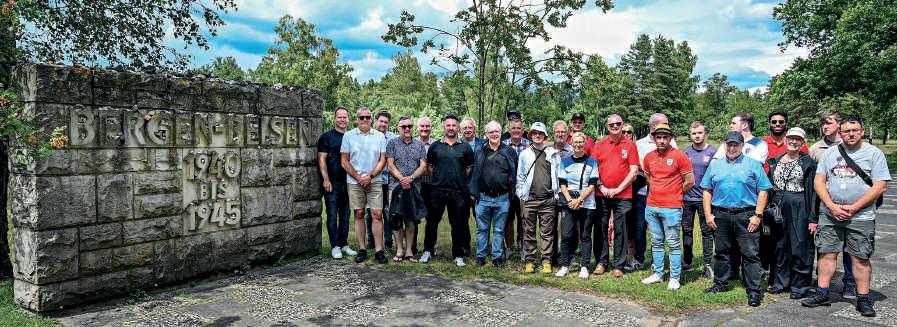


the connection to British soldiers being involved in the liberation, which next year marks 80 years.
Speaking to Jewish News, Lord Mann said: “You can’t prepare people for that kind of thing.
“They were unanimous in their feeling that the visit was hugely worthwhile. We learned about Bergen-Belsen’s history and also
“It was highly appropriate that the Football Association wanted to be involved and very pleasing there was such a big take-up.”
Bergen-Belsen began as a camp for Allied prisoners of war, but became a Nazi concentration camp in 1943 after it was turned over to the SS.
Disease and starvation were rife as a result of overcrowding and horrific living conditions, and it is believed around 50,000 people died there throughout the duration of the war.
The victims included Anne Frank and her sister, Margot. Most were Jews who had been deported.
British forces burned down the whole camp after the liberation to stop the spread of typhus.
Reflecting on his visit, Lord Mann said: “The fact that there’s nothing there because everything was deliberately destroyed, actually made it, at times, a more di cult experience for
King Charles has renewed his patronage of Jewish Museum London, writes Michelle Rosenberg.
Currently operating as a museum without walls as it looks for a new home, Jewish Museum London is one of 1,000 organisations King Charles has chosen to continue supporting.
Incoming chief executive Sally Angel said: “The museum tells the story of the Jewish community and its role in the life and society of the United Kingdom, past, present and future. It now has an extraordinary opportunity to connect its world-class collection with the power of story and use digital innovation to reach wider and more diverse audiences.

people. There was silence amid the graves, highly-visible mass graves.”
Board of Deputies vice-president Andrew Gilbert recited kaddish as the group gathered round the BergenBelsen obelisk memorial, before a wreath was laid by fans.
Gilbert described the moment as “very meaningful” and added: “To work with the FA and set up the opportunity for British fans who chose to join the trip to a concentration camp just hours after getting back from the Serbia-England game was humbling.”
FA head of diversity Dal Singh Darroch added: “It was a very sobering and insightful day.
“I think fans really appreciated the
opportunity and the experience was one many will never forget.”
One fan named Harry, who has travelled to Germany from Coventry, said: “It’s really important to visit these sites.
“I think it’s really important for fans to learn about this, to say ‘Never Again’, because it happened only 80 years ago.”
The tour was arranged as part of the organisers’ Football and Remembrance initiative.
This is a special project which is encouraging fans to visit memorials, places of remembrance and museums to learn more about the links between sports and Nazism, as well as hear stories of those who were persecuted.
Three teenage boys have been arrested in France in connection with the alleged gang-rape of a 12-year-old Jewish girl.
The boys were arrested on Monday after the girl reported the incident in the northwestern Paris suburb of Courbevoie.
angry that the young girl hid her Jewish identity.
Le Monde newspaper reports that she was attacked in a park near her before being dragging into a shed and gangraped.
Writing on Twitter/X, Chief Rabbi of France Haim Korsia said he was horrified.

The Jewish Museum London currently has items on display at Tate, The National Holocaust Centre and Museum, JW3, The Hackney Museum, Manchester Jewish Museum as well as pop-up exhibitions at Swiss Cottage Library.
“The story of Jews in Britain speaks of freedom, persecution, resilience and belonging. My ambition is that the Museum will be a beacon of hope for all minorities living here and more than a small step against prejudice.”
According to newspaper Le Figaro, the boys were indicted for gang rape, death threats, antisemitic violence, attempted extortion, invasion of privacy, violence and insults.
Unconfirmed reports suggest that the attack was an act of revenge by an ex-boyfriend
“Justice must firmly sanction the perpetrators of this despicable act. No one can be excused from this unprecedented anti-Semitic surge. No one can ignore that the slayers of hatred also have their share of responsibility.”
Le Monde reports that antisemitic acts in France increased three-fold in the first months of 2024, compared to the same period a year ago, Of the 1,676 antisemitic acts recorded in 2023, 12.7% took place in schools.







The King’s Birthday Honours list brings well-deserved recognition to outstanding people who have dedicated their lives to the Jewish community and beyond. For the purposes of this editorial we would like to focus on one.
When the founder of the Israel Guide Dog Centre UK (IGDC) died in January, he left an unfillable hole in the heart of our community.
Martin Segal MBE wore many important hats, including a cycling helmet that was placed on top of the Israeli flag draped across his coffin. His passion for cycling was only rivalled by his commitment to Israel and he constantly tried to combine the two through fundraising, notably in 2019 when he cycled from London to Be’ersheva for the IGDC.
Despite a 19-month battle against cancer, Martin remained devoted to the Israel Guide Dog Centre and continually sought new fundraising opportunities.
The horrors of 7 October and its aftermath distressed him but also strengthened his resolve to support the charity, which has been struggling with understaffing and an influx of new puppies and abandoned dogs.
Martin’s honour means so much to to his colleagues at the guide dog centre in Israel, where they marvelled at his dedication to fundraising and love for the people the centre helps. He was always so thrilled to unite a blind person with a dog that would become a lifeline. He knew them all personally because he was so special.
“You won’t let them forget me,” he urged one of this newspaper’s journalists when they visited him for the last time. This honour shows no one has.
Sales Manager Marc Jacobs 020 8148 9701 marc@jewishnews.co.uk
Sales Yael Schlagman 020 8148 9705 yael@jewishnews.co.uk
Operations Manager Alon Pelta 020 8148 9693 alon@jewishnews.co.uk
Your editor wrote an excellent, factually informative and powerful article. (Israel-Hamas has always been hope versus hate, 14 June). His hopeful conclusions, while logical, need qualification. The “poisoned priorities” to which he refers are embedded within established mainstream Islamic beliefs and aspirations, and thus shared by much of the Islamic world, not just by ‘Palestinians’. They need to be uprooted for long term peace to be achieved.

The focus of the West on Palestinian statehood as a solution is an illusion. The seeds of perpetual violence against Israel are germinated not by secular political recognition but by pan-Islamic religious aspirations. The last 76 years, from an Islamic perspective has been a perpetual humiliation. The foundation of any lasting solution requires a miracle – influential religious leaders of the Islamic world conducting a re-examination of their Koranic texts, with the goal to legitimise the existence of a Jewish state. Warren Braham, Hendon
As some readers will have noticed it happens to be LGBT Pride week, which means supermarket websites and libraries displaying a flag that used to be a beautiful rainbow but now has so many more additional colours and symbols it is a nonsense. They call it the Progress flag, but it’s not exactly progress when trans ideology leads to the sidelining of the concerns of gay people, the erosion of women’s rights and the dilution of protection for single-sex spaces.
As a veteran of Pride marches in Tel Aviv as well as London when they were a celebration of hard-won acceptance, freedom and rights for gay and lesbian men and women, I am sad that I no longer feel part of the movement or feel I have anyone to represent me.
I’m concerned too that synagogue movements in this country have been captured by trans ideology and are prioritising ‘gender identity’ over sexbased rights.
Name and address supplied
Thank you for helping to make Jewish News the leading source of news and opinion for the UK Jewish community. Unlike other Jewish media, we do not charge for content. That won’t change. Because we are charity-owned and free, we rely on advertising to cover our costs. This vital lifeline, which has dropped in recent years, has fallen further due to coronavirus.
Today we’re asking for your invaluable help to continue putting our community first in everything we do. For as little as £5 a month you can help sustain the vital work we do in celebrating and standing up for Jewish life in Britain.
Jewish News holds our community together and keeps us connected. Like a synagogue, it’s where people turn to feel part of something bigger. It also proudly shows the rest of Britain the vibrancy and rich culture of modern Jewish life.
You can make a quick and easy one-off or monthly contribution of £5, £10, £20 or any other sum you’re comfortable with. 100% of your donation will help us continue celebrating our community, in all its dynamic diversity.
Support Jewish News by visiting our donor page at jewishnews.co.uk
I write to express my dismay at the decision to attack Barclays for its alleged ties to defence companies supplying Israel, resulting in the suspension of their sponsorship of Live Nation festivals. This action is not only misguided but also counterproductive.
The boycott by artists and the subsequent suspension of sponsorship overlook the most important issue. These festivals are economic drivers, providing employment and boosting local economies. By targeting Barclays, the protesters harm the very communities that benefit from these events.
Instead of fostering constructive dialogue and understanding, this simplistic, symbolic plain stupid nonsense promotes division and hinders cultural experiences that bring people together.
Adam Dressen, By email
I am a lifelong Conservative voter, but after 14 years of utter chaos, Brexit and five dreadful prime ministers (well, perhaps aside from Theresa May), how can I possibly vote Tory? Deeply painful memories of the Labour Party, with Keir Starmer in a key role, being hijacked by far-left antisemitism are still fresh in the mind (some of the MPs who excused Corbynism are running for re-election this time round) so I cannot vote Labour. The Greens are toxic, the Liberal Democrats irrelevant and Reform dangerous. So I can’t vote for any of them either. I also can’t abstain, having proudly voted in every general election since 1979. In which box shall I put my cross in two weeks’ time?
Fran Secker, By email





‘Look, for the last time, it’s been 14 years of Tories, not 14 years of Tsoris!’


Open Days
DAILY FROM 24TH JUNE TO 30TH JUNE
10.00AM - 4.00PM
As part of National Care Home Open Week we are delighted to be hosting a daily Open Day for our local community to visit us and enjoy all that Signature at Hendon Hall has to o er.
Moving into a care home doesn’t have to mean giving up the ner things in life. At Signature at Hendon Hall, you’ll nd a safe, warm and caring environment. Expansive communal areas and gardens as well as intimate cosy corners and places to read, dine, chat, play or just unwind, allow residents to retain their independence in style.
To book your personal show round, please contact the Client Liaison Managers on 020 3131 3028 or email enquiries.hendon@signaturesl.co.uk
signature-care-homes.co.uk/hendon Signature at Hendon Hall, Ashley Lane, Hendon, London NW4 1HF

Netflix’s new six-part docuseries, Hitler and the Nazis: Evil on Trial, tackles a familiar subject: Hitler’s rise to power and the Nuremberg trials that followed World War II. While the series revisits wellknown historical events, its main goal, according to director Joe Berlinger, is to present the Holocaust in a way that resonates with younger audiences.
This is especially important given surveys worldwide show a troubling lack of Holocaust awareness among millennials and Gen Z. Many young people are unaware the Nazis murdered six million Jews during WWII. Some believe Jews caused the Holocaust, others can’t name one concentration camp.
Disturbingly, in certain circles, is a shift from mere ignorance to a twisted form of
Holocaust a rmation, with some suggesting Hitler was right – a chilling reminder of how quickly history can be distorted. The Netflix series aims to address this knowledge gap by leveraging the power of modern storytelling techniques and the reach of digital media platforms, seeking to engage a demographic that primarily consumes information and entertainment through streaming services and social media.
There is no denying the power of popular culture. It can reach vast audiences, including those who may not engage with traditional forms of education or historical literature. Films and TV shows can evoke powerful emotions, bringing the Holocaust to life in ways that grip viewers on a deeply personal level. The visual and narrative storytelling on these platforms can create a profound impact, making historical events more relatable and memorable. Through the power of film and television, we can keep the lessons of the Holocaust alive, ensuring future generations understand the importance of remembrance and the dangers of hate and intolerance. Yet, there are inherent challenges in
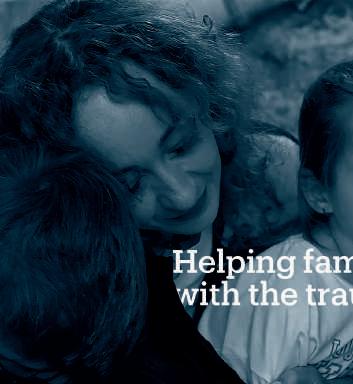




portraying such complex and sensitive subject matter through entertainment media. Dramatisations, while gripping, may distort historical facts – inadvertently or deliberately for dramatic e ect – or oversimplify nuanced aspects of the Holocaust. The balance between creating an engaging narrative and maintaining historical accuracy is delicate and di cult to achieve. This can lead to misrepresentations that might undermine the educational value of the work and perpetuate misunderstandings about the Holocaust.
The brutality of the Holocaust can be di cult to portray authentically, potentially lessening the impact. Graphic depictions of violence and su ering, while aiming for realism, might alienate viewers or lead to desensitisation rather than a deeper understanding of genocide. On the other hand, toning down the brutality of the Holocaust to make the content more palatable can lead to a distortion of historical reality and dilute the profound lessons it carries.
As we navigate the intersection of pop culture and Holocaust education, it is crucial to strike the right balance between honouring
the memory of victims and preserving the integrity of historical truth. Popular culture, with its vast reach and emotional impact, holds tremendous potential to engage and educate future generations about the Holocaust.
The challenge we face is ensuring that pop culture serves as a springboard, not a substitute, for historical understanding.
Educational resources, such as those produced by the Holocaust Memorial Day Trust, play a vital role in enriching the viewer’s understanding of the events depicted in popular culture. First-hand testimonies from survivors convey personal experiences and emotions no dramatisation can fully capture.
Holocaust Memorial Day (HMD) commemorations o er a structured opportunity to reflect on the lessons of history and commit to preventing future atrocities. These commemorations are not only about remembrance but also about education and action.
The key is leveraging the power of popular culture thoughtfully and sensitively, and without losing the impact of survivor testimonies or Holocaust Memorial Day as the annual day of remembrance.
We’re a little different from other Estate Agents…
Do you have a property to sell or let?
List it with us and we will take the stress out of finding a buyer or tenant
Why choose Squires?
Established in 2004, we advertise on all the major property portals including Rightmove and Zoopla and have 3 linked branches within North-West London.
Why choose me?
With 15 years experience I have a deep understanding of the local property market and living in Hendon means I have a wealth of useful contacts.
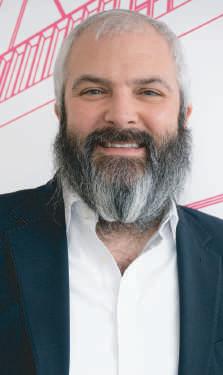
 RICHARD MIRON CEO, EARSHOT STRATEGIES
RICHARD MIRON CEO, EARSHOT STRATEGIES
In the past few days, the focus of the conflict in Israel has shifted from the south to the north. Fields in the Galilee are ablaze as a result of Hezbollah missiles launched from Lebanon. The growing exchange of fire across the border is extremely dangerous and could erupt into a full-blown conflict
A war with Hezbollah would be devastating. The Iranian-backed organisation has more than 100,000 missiles ready to be launched . Its tens of thousands of fighters are battle hardened and highly trained.
But the dual threats Israel faces on opposite sides of the country are compounded by another critical factor from within: the presence of Benjamin Netanyahu’s government.
At a time of its greatest need, Israel finds competent leadership at its most lacking.
Netanyahu may be the country’s longestserving prime minister but he is distinctive

from the others in many notable ways. David Ben Gurion, Israel’s first leader, knew the viability of the young nation depended on the integrity of its internal institutions, along with its international standing. He nurtured Israel from fragile independence to become a united and respected nation.
Menahem Begin, the first Likud prime minister, was a strident defender of the country despite his earlier reputation as a right-wing rabble rouser. He respected Israel’s democratic institutions, and when faced with the loss of hundreds of troops in the first Lebanon War, he retreated from public life.
Yitzhak Rabin was IDF chief of sta during the Six Day War and then prime minister twice. He became a warrior for peace in brokering the Oslo Accords and was murdered for his courage by a right-wing religious extremist.
Bibi lacks all the qualities of his predecessors, seeing Israel as serving his interests rather than the other way around, and is overseeing a fracturing of Israeli society from within while trashing its standing on the international stage.
Unlike Golda Meir, who resigned eight
months after the disastrous Yom Kippur War, Netanyahu is hanging on to power at all costs, fuelled by a desire to avoid trial on corruption charges that would follow his exit from o ce.
After Hamas’ October attack, Netanyahu sought to shift responsibility on to the army and intelligence agencies. Israel had just begun its war in Gaza to hunt down Hamas’ leaders and recover the hostages, but Bibi was more concerned with preserving his own position.
Netanyahu is desperate to erase from public memory it was his policy of strengthening Hamas in Gaza by allowing in huge amounts of money from Qatar and elsewhere that allowed the organisation to prepare for 7 October.
He is also keen to make people forget
the chaos and division he sowed before 7 October, spending much of last year trying to force constitutional change in a sly grab for power. This brought hundreds of thousands of Israelis on to the streets in protest.
Netanyahu’s policies lie in tatters and he is now embracing the most extreme elements within Israeli society to retain power. This has meant handing over control of the police and supporting a law to exclude from the draft permanently ultra-orthodox men while other Israelis are fighting and dying in Gaza.
Netanyahu’s desire to hold on to power is becoming ever more desperate, most recently disbanding the mini-war cabinet that had been overseeing the conflict after the resignations of leading opposition Knesset members.
Just when Israel needs to be united, it finds itself torn apart by Bibi’s mis-rule.
Nothing is sure about what will happen now. But one thing is for certain, that with Benjamin Netanyahu in power, Israel’s enemies get stronger and the country becomes weaker.
The fight for Israel’s future is now and the first step must be to oust Netanyahu.
It is easy these days to get very dark about the outlook for Israel and the Jewish people in the diaspora.
In Israel, the combination of a really complex war in Gaza and its tragic casualties and an existential risk with Iran and its proxies in a country still under shock from the 7 October attack and with large parts of its population displaced leads to understandable distress.
Having 120 hostages still in captivity for more than 250 days haunts us continuously. Abroad, our communities are attacked for merely being Jewish, and Israel is wrongly accused of unspeakable things by people who are more worried about statements than facts. Given the complex political situation in Israel and across the world and the length of this conflict, it is understandable to be depressed and it is not easy to see the light at the end of the tunnel.
We are not going to find easy solutions to these problems. Politicians all want quick fixes but we all know that they don’t exist here. Instead, we need to build the blocks
from which solutions will be able to be developed over time. This requires not only time and effort but patience and resolve. We will best succeed if we move forward with a spirit of solidarity and courage.
To see where I am coming from, allow me to tell you a little story that happened to me and a couple of my friends.
In the aftermath of 7 October, I suggested that my friends abroad come and visit the country. My best friend from the US (who is an exceptional Zionist anyway) quickly arranged a trip and came with his business partner.
During the trip we visited troops near the border of Gaza that were getting ready to go in (this was really soon after 7 October).
As we were driving through a base and approaching a checkpoint, we were debating in the car whether we could take pictures as we were surrounded by hundreds of military vehicles. Our windows were rolled down and one of the soldiers heard our conversation. He motioned for us to get out of the car.
We thought we were in trouble for a moment, but the o cer in charge was simply suggesting that we get out and take pictures with his unit.
This uniformed o cer was loaded with more weapons that I can describe and was hours away from entering Gaza. We took a few pictures with him and the unit and wished
them health and success. The commanding o cer, it turned out, had lived in New York for some time (he is a lawyer) and established that he had a couple of common acquaintances with my friend’s business partner.
Wow, what an example of Jewish geography! We got back in the car and drove on, amazed by the courage of the soldiers we had met and how small the Jewish world is.
And then, about an hour later, one of our party received a LinkedIn invite from the commander.
The guy is about to go into Gaza, but before he does, he finds the time to connect with a random visitor from NYC. That’s amazing! Fast forward, thankfully the leader of the unit finishes his tour in Gaza safely, goes back to his work, continues the conversation started at the Gaza border and ultimately the commander is now working on a private equity deal with my friend from NY. From the military field to private equity.
Of course, there are amazing stories of heroism and tragedy which have occurred in the last six months and this story does not compare. Nevertheless, I took several things away from it.
First and above all, we need to have courage in what we do. Courage that we have seen in our soldiers, but we also see it in thousands of people across the world who are all trying to
make a di erence in their own way. But also, we cannot forget solidarity – we should be open to helping and connecting as much as we can in situations that we might not even have planned or might not be our normal path.
Going to a military base to find your next legal counsel is not the normal way. But my friend showed solidarity and respect for the courage of the o cer not just to enter Gaza but to respond when he reached out and truly follow up.
These are times when it is di cult to know how you can help or what we can do in this war. The feeling is overwhelming. But in addition to courage, we can approach all of our e orts looking for solidarity and to help those who are fighting our fight.
There is not only one way that we are going to overcome the current set of challenges, but together we will prevail. We have in the past and we will again.
As you assess all you are doing these days, stay positive and think about whether you are focused both on courage and solidarity. If so, keep at it. If not, see how you can change what you are doing to achieve them.
Courage and solidarity will help us overcome our current di culties and block by block we will reach a day when the light will be there at the end of the tunnel.
Of that I have no doubt. Am Y’Israel Chai.
More than 70 participants from around the world descended on Provence for the annual Chana Car Rally, enjoying magnificent scenic drives and later hearing from charity chair of trustees Benny Groszman at a gala dinner. Keynote speaker Rabbi Yitzchak Shochet spoke of the pain and challenges of infertility and the importance of supporting a charity like Chana. Donations from last year’s rally have seen the birth of 42 Chana babies since last May.
In the lead-up to her batmitzvah, 11-year-old Izzy Konviser embarked on a heartfelt fundraising mission, raising more than £1,390 for Israel Guide Dogs, the charity that helps individuals including soldiers suffering from PTSD and children with anxiety. Izzy recruited friends and family for a charity dog walk and said: “I wanted to support people living in Israel and I love dogs.” Donations can be made at justgiving.com/ page/charity-dog-walk-igd-uk
Jewish Care pulled out all the stops to honour its 3,000 dedicated volunteers during this year’s Volunteers Week. Volunteers at the Southend and Westcliff Jewish Community Centre, were treated to a celebration lunch, a fun quiz took place at Brenner Stepney Community Centre and volunteers from the Michael Sobell Community Centre took part in a dance video on Jewish Care’s TikTok.
The Malki Foundation UK Golf Day at The Shire London raised £10,000 toward providing speech, occupational, physical, hydro and horse-riding therapies to severely disabled children in Israel and helping to reduce the Malki Foundation’s growing waiting list. Winners Cedric Solomon, Jeff Rubenstein, Derek Murray, Julian Goldie and runners-up Lewis Jacobs, Ray Rubenstein, Richard Grigsby and Geoff Abrahams received their trophies from UK chair of trustees Geoffrey Hartnell.
Laniado’s annual whisky-tasting trip this year ventured into the Scottish lowlands with visits to Lindores, Tullibardine, Deanston, Auchentoshan and Glengoyne distilleries, and a rare opportunity to sample a 20-year-old whisky straight from the barrel at Deanston. The £25,000 raised goes toward the expansion of Laniado’s new Sheltered Emergency Unit, currently Israel’s largest hospital expansion project.
More than 100 Chai trustees, client service managers, counsellors, therapists and fundraising and admin department members travelled from Chai’s 11 centres across the UK, including Glasgow, Manchester, Liverpool and Leeds, for a ‘family’ away day at the flagship centre in Hendon filled with learning, team-building activities, delicious food and plenty of laughter.

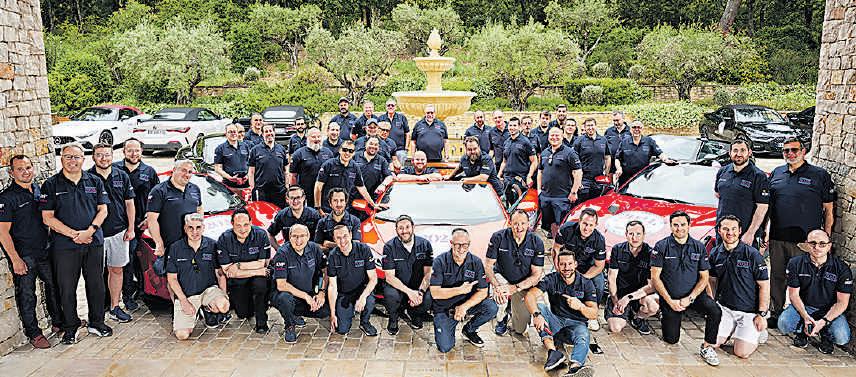




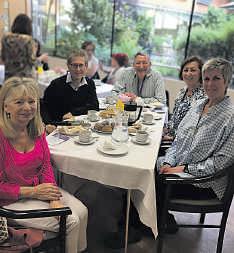


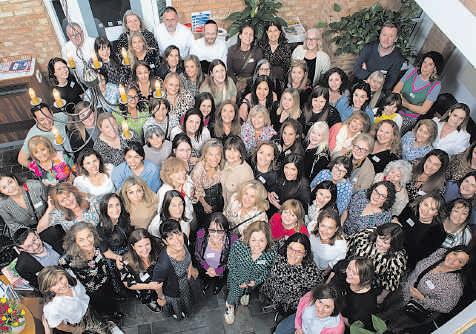



•
•
•
•
•












Photographer to the stars
Bereavement tech
In the month marking 100 years since the writer’s death, what better way to tell his story than in a play, says Jewish News’ theatre critic Poppy Shulman
How did a Germanspeaking Jewish lawyer from Prague end up with the linguistic accolade of an eponymous adjective listed in the dictionary, namely ‘Kafkaesque’ – meaning “of, relating to Franz Kafka or his writings and having a nightmarishly complex, bizarre, or illogical quality”.
Kafka, born 3 July 1883 to Julie wand Hermann, is the author of some remarkable works, notably The Metamorphosis, The Trial and The Castle. Many believe that the man was as tortured as the characters he created. Jack Klaff, the writer and performer of the play Kafka, which is showing at Finborough Theatre, says that this perception is far from the truth.
“Yes, Kafka had this prodigious talent, and he was an extraordinary person, but he wasn’t that much of a freak or weirdo. He was deeply sensitive, but we now know he could be gregarious – a popular, pretty regular guy. He came from an ordinary Jewish family, he had loves and passions just like most people do. And, at first, he followed a conventional path. He applied to study chemistry then, after two weeks, switched to study law and went on to become a doctor of law.
“But it was while this was all happening that he started to write. And it was this that changed his life and eventually turned him into a household name. A miraculous observer of people, he had, even as a youngster, noticed people’s features, gestures, and mannerisms. He had an intuitive understanding of the feelings of others, and this was one of the many sparks that inspired his writings.
“Kafka certainly was prescient. He never set himself up as any kind of prophet. But simply by delving deep within himself and by being so profound, so wise, he was able somehow to sense situations long before they became a reality. And when one looks at his works, and one considers he was writing over 100 years ago, his writing is still
relevant and feels remarkably contemporary. His creativity and innovation have influenced many generations of artists, including scores of playwrights.”
The play transports us back in time to early 20th century Prague. Kafka and his writing are brought to life and given perspective in a journey that spans many decades and includes encounters with many notable people including scientist Albert Einstein and author Albert Camus.
Multi-award-winning actor Jack plays 49 characters. As he seamlessly changes roles the audience learns about the real Kafka: his family, his life, his loves and his phenomenal talent. A one-man show, the story is told not by Kafka but through the eyes of his close friend, the Israeli-born author and biographer Max Brod. And it is to Max that the literary world owes a huge debt. When Kafka died, he left instructions for Max, as his executor, to destroy all his work. Not only did Max refuse to comply with this request, but he also managed to preserve the writings for future generations. Max protected the papers from Nazi hands during the Second World War by transporting them to Palestine.

Then, when war in the Middle East looked imminent in 1956, he transported them to safety in the UK.

The idea of the play came to Jack in 1983. “I started to research Kafka and I realised how little I knew about him. I was mightily confused by the different views about him I came across,” says Jack. “The fact that Kafka was Jewish wasn’t mentioned at that time as much as it should have been. Jewishness permeates everything he writes.
It’s quite right that he belongs to the world. But it’s magnificent that he is such a credit to the Jewish people.”

Kafka was brought up in Prague, the city of the Golem, and Jewish mysticism drew him in, “as did the Talmudic approach to any question, yet simultaneously he had a feeling, as a Jew, of somehow being an alien. In his life and in his writings many of his characters experience unease and awkwardness,” says Jack. “He was excited by Yiddish as a language. He wasn’t a campaigning Zionist, but he worked hard to learn Hebrew. And at the time that he was dying he talked seriously about moving to Palestine. His experiences as a lawyer involved with workers’ compensation bolstered his unique insights into the worlds, the perspectives, the sufferings and the agonies of many other people too.”
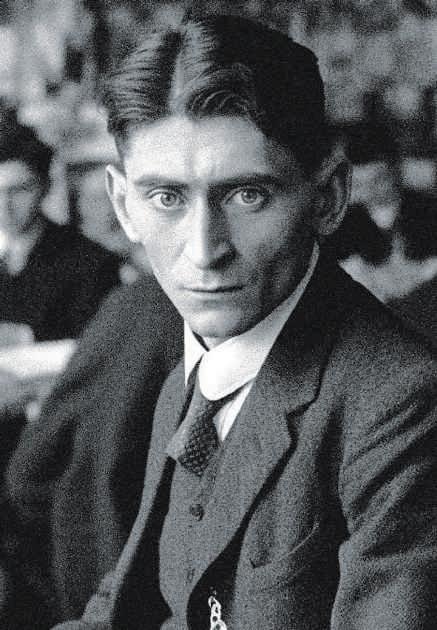
the Yiddish theatre folk visited Prague, Kafka was a regular in the audience for their performances at the Café Savoy. Some Prague Jews looked down on these impoverished artists, but for Kafka they were full of life and he loved their spirit. “They brought to him what he felt Jewishness should be: the beautiful words, the wonderful, convoluted tales, and the laughter. They were modern people, but they carried within their souls a great tradition. He loved them,” says Jack. “The performances were diverse, and he was fascinated by performers such as Mrs Klug– a male impersonator – and in particular the actress Mania Czyzyk, for whom he carried a torch. He writes pages about her in his diaries,” says Jack. “He saw all humanity in one human being. He understood that there is a universal longing people have, in their deepest moments, when they want to understand what life is, why we are here, how we should live and where we are going.”
In some ways there are similarities between elements of Kafka’s and South African-born Jack’s lives. Both were brought up in traditional Jewish homes, but neither was particularly religious. Both studied
law and then diversified into theatre and performance.
Jack came to the UK in 1973 to study at the Bristol Vic Theatre School. Originally intending to become a director, his tutors, recognising his acting talent, persuaded him to first tread the boards then to subsequently become a writer and director. His film credits include Star Wars and he has appeared in countless films, television and radio shows.
The staging of Kafka is a rare opportunity for audiences to see the impeccably researched play that Jack is reprising after its earlier run 35 years ago. This latest iteration of Kafka is true to the original version but has been slightly updated to include more recent research.
Jack says: “In Kafka we have before us the modern mind at its best. So I’m hoping to present all of humanity in this one wise human being. Kafka understood there is a universal longing people have, in their deepest moments, when they want to understand what life is, why we are here and how we should live.” l Kafka runs until 6 July at the Finborough Theatre, in Earls Court: finborough theatre.co.uk
WhenHaving discovered Gemma Levine’s exquisite photography by chance, Barry Borman set out to meet her to find out how she does it
Rifling through the bookshelves in my local charity shop in Stamford Hill, my eyes alighted on a book titled Just One More… by Gemma Levine. A quick Google search revealed that she’s a photographer, now in her 80s, who has published some 27 books and has exhibited her images extensively worldwide. She’s had several exhibitions in Israel, including at the Jerusalem Theatre and Tel Aviv Museum, and her entire archive in Israel is housed at the Israel Museum in Jerusalem. She’s visited Israel on many occasions and has a great affinity for the land. Her heartfelt photographic images of the country and the people of Israel have been prominently displayed at a prestigious London venue.
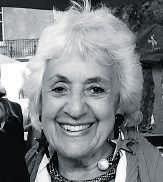
where the celebrity actually wants to be photographed by her.
Born in 1939 in north London, Levine attended Hasmonean grammar school. There’s something of a parallel between her youthful introduction to photography and my own childhood efforts. We both possessed rudimentary Kodak cameras, and while I took black-and-white summer holiday snaps of the beach and windbreakers on the Belgian coast, she was taking colour landscape images of the London suburbs. She met her husband at Hillel House, part of London University (I knew that well, too), marrying in 1961 at West Hampstead Synagogue. Having already toured Israel at 17 with the Zemel Choir, of which she was a member, she arranged for the choir to sing at the chuppah.

her Rehavia home, Meir served her tea and home-baked fairy cakes. Although Meir was ill, Levine wanted her to be the first to see the published book and took it to her hospital bedside. Meir died two months later. Levine also collaborated with Yehuda Avner (one of Golda Meir’s speech writers) in The Young Inheritors (1982), a moving portrait of Israel’s younger generation.
In 1976, having heard about British sculptor Henry Moore from a friend, she wrote to him on impulse, hoping to learn from him about art. She estimated it would take about a week to complete her photographic assignment. In the event, her three books on Moore were published over a period of almost 10 years. From him she learned about definition and shadows, light and shade, and also the ability to become “part of the furniture”, blending in with her subject, all of which served her well throughout her long career. It was Moore who coined the epithet Gemmalevine (all one word), thinking it was her first name.

She’s also produced beautiful large-scale coffee table books on Mayfair (where she currently lives) and Claridge’s hotel.
Having acquired a number of her books, I emailed her to enquire whether she would kindly sign my copies. She responded immediately, overwhelmed by my admiration, wanting to frame my letter and suggesting that we meet at her flat in Mayfair. I was keen to find out more about the person behind the lens.
Chutzpah isn’t usually a word you use to describe the requisites of a professional photographer. Expressions such as “an eye for a picture” and “the ability to be in the right place at the right time” come to mind. Levine has all of these and more, but you don’t get to photograph Princess Diana, prime ministers and doyens of sports, stage and screen by offering them merely your technical ability. It’s not even a matter of who you know. For Levine, it’s always been how can she insinuate herself into a position
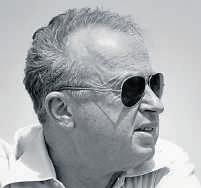
In 1974 she was asked to assist a local photographer at the Royal Albert Hall, where Golda Meir was appearing. Armed with her basic Instamatic, she crawled between the legs of the crowd of photojournalists, securing a couple of images of the former prime minister. One of these photos was published in a daily newspaper, and that springboarded her whole career.
The following year, while on holiday in Israel, she daringly telephoned Moshe Dayan and secured an invitation to his home in Tzahala, completing the photo session with her newly acquired Olympus camera. On showing these photographs to another contact, the publisher George Weidenfeld, she was commissioned to return to Israel.
The fruits of many repeat trips over seven years were two books with major personalities. In Moshe Dayan Living with the Bible (1978), Dayan, a keen amateur archaeologist, explores his findings in the context of familiar biblical texts. Israel Faces and Places (also 1978) was prefaced by Golda Meir, following Levine’s spontaneous request. At
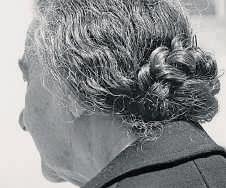
Now a well-established worldwide photographer of celebrities, Levine has produced a number of portrait books, such as Faces of the ’80s and People of the ’90s. She also negotiated extended access to the famous Claridge’s hotel in London for Claridge’s – Within the Image (2004). Here again, chutzpah magic came to the fore. Without anywhere to live while her newly acquired next-door apartment was being refurbished, she offered herself to Claridge’s as “photographer in residence” in exchange for bed and breakfast. In the event, she was allocated a luxury suite and spent some months photographing the hotel staff and guests for her book.
Throughout her professional career, Levine has donated the proceeds of the majority of her books to charitable causes: Faces of the ’80s for the Sharon Allen Leukaemia Trust (Sharon was a nine-year-old girl with leukaemia), People of the ’90s for the Malcom Sargent Cancer Fund for Children, and Memories (1998) for the Alzheimer’s Society. She has staged concerts and launched campaigns for many other worthy charities.
In 2010, Levine was diagnosed with breast cancer and subsequently with lymphoedema (localised tissue swelling caused by an accumulation of fluid usually drained

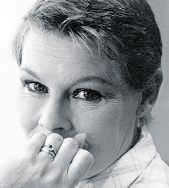
by the body’s lymphatic system), which has somewhat impaired her ability to deal with the logistics of taking photographs. She has, nevertheless, continued to publish, writing on her cancer experience (Go with the Flow, 2012) and, with a medical expert, the definitive guide to lymphoedema (Let’s Talk Lymphoedema, 2017), offering advice and support for sufferers. Bringing it all together is Golden Threads (2022), with proceeds going to Lymphoedema Research, in which she shares the emotions and memories of her interaction with the many well-known people who have sat at the other end of her lens. Recently she arranged a fundraiser for lymphoedema at Claridge’s, with the hotel and a number of distinguished personalities, including Dames Judi Dench and Joanna Lumley together with Simon Callow, volunteering their services to the cause. I came away intoxicated that I had met an exceptional talent. Not only that, but Levine is as kind and generous a person as you could find. It’s refreshing to know that, in this sometimes impersonal world in which we live, there are people out there who really care. • To make a donation to Gemma Levine’s charity, the Lymphoedema Research Fund, visit stgeorgeshospitalcharity.org.uk
■ A version of this article originally appeared in the Jerusalem Report and is reproduced with kind permission


A growing number of companies are harnessing technology to provide compassionate online support for the newly bereaved
s the old adage goes, the only certainties in life are death and taxes; yet, when it comes to the former, the support and resources available for helping people to navigate the grief that follows bereavement are significantly underserved.
About three million people are bereaved in the UK each year, and each month 100,000 people type into Google, “what to do when someone dies”.
We are seeing the growth of a number of companies across the globe who are trying to tackle this gap by harnessing technology to provide comprehensive and compassionate bereavement support for individuals and workplaces.
Among them is the UK-based tech-for-good startup Untangle, which emotionally, practically and socially supports the bereaved through its app, and Empathy, an end-to-end grief support company aimed at changing how the world deals with, perceives and approaches loss.
The global market for grief and bereavement technology is growing rapidly – currently estimated at around £22bn in the UK alone, the global deathcare services market is estimated to reach $18bn (around £150bn) by 2030 as more people turn to digital solutions to help them cope with loss and connect with supportive resources.

When Emily Cummin’s grandpa passed away in 2016, she felt lonely and overwhelmed as she helped her mum wade through confusing and complex admin. Struggling to find the right support, she decided to leave her job advising startups to build one of her own to help people navigate life after loss.
Cummin’s AI-driven Untangle Grief app is a one-stop-shop that supports people through and after a bereavement, including all the financial, legal, practical and emotional challenges.
Launched in late 2020, Untangle currently supports 65,000 members in 138 countries – the UK and the US are the largest markets.
The platform uses AI to provide personalised content, care and coaching. In the first quarter of this year, the business reached over 31 million people across its social platforms and has been socially prescribed in several NHS regions. Untangle recently launched with Cruse Bereavement Support, the UK’s leading bereavement charity,
to enable employers to support their employees going through grief, and has also secured its first corporate client.
TV personality Davina McCall applauded Untangle on her Making The Cut podcast. She said: “If you love someone and have lost someone, Untangle is your place.”
Cummin, 31, tells Jewish News: “When my grandpa died, it was a very di cult time. I was 24 and supporting my mum and my grandma and I didn’t know where to go for support and what advice to trust. I was grieving and it felt very sad and emotional.
“I felt that, although we are all going to go through one of these [grief] events in our life, there was no one place for people to get all the support they need. Yes, there are charities, but long waiting lists can make bereavement support hard to access.”
Cummin, who last month won the London regional final at Tech Nation’s Rising Stars and earlier this month pitched at London Tech Week 2024, has already secured investment from Innovate UK, Zinc VC and Redbus, the investment group started by entrepreneur Simon Franks, founder of LOVEFiLM, and is currently crowdfunding to further develop the product in preparation for addition to the Rated Experts marketplace in 2025, and help to take the business to profitability.
Chief medical o cer of the Oxford NHS Trust Dr Karl Marlow and the former CEO of GreenAcres Group and managing director of Co Op Funeralcare Richard Gomersall

are among Untangle’s industry advisers.
“I’ve always believed in it and I know there is a big £100bn market opportunity. I have seen it firsthand,” says Cummin. “Everyone I talk to has said that they wished there was something like this when they were going through it [a bereavement].”
Cummin, who has a background in business strategy, says Untangle started as a community support WhatsApp group for bereaved people who used it as a helpline.
“I knew the need was there and the market is finally ready to talk about this sensitive taboo issue and use technology to get bereavement support online. Yes, using tech for grief might feel a bit uncomfortable but we are at a point now where we trust technology – we use it for online shopping, banking and other admin.”
Untangle uses AI to create personalised plans for people. “When people die, they often feel like they have lost the support and have loads of admin. We want to flip that around. You don’t have to work out what you need to do - we can send you those specific needs week by week and tell you what to do. But the emotional support is all through peers, and tailored coping tools such as mindfulness activities or breathing exercises. The AI just works out when is the right time to send them the right exercise.”
ment to grief and interpersonal conflict. It was founded in 2021 by Ron Gura and Yonatan Bergman – the duo had previously worked together at WeWork and, before that, at the Gifts Project, which, founded by Gura, was acquired by eBay in 2011. Their goal: to change how the world deals with, perceives and approaches loss.
O ering human care, supercharged by technology, Empathy’s award-winning app and care team provide bereaved families with a holistic and personalised support system to help with all the administrative, emotional, legal and financial challenges they face, as well as care resources to support people through the grieving process.
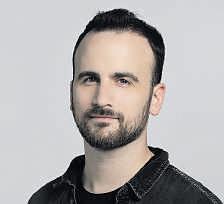
Empathy is o ered by employers and life insurance providers to employees and beneficiaries, who are able to access the full range of Empathy services for free. The company, which supports 40 million people across the US, has raised $90m to date, from Index Ventures, General Catalyst, Entrée Capital, Aleph, Latitude, Brewer Lane and Primetime Partners. Empathy also has strategic investments from major life insurance carriers and prominent angel investors.
Untangle is very much a passion project for Cummin, who has plans to introduce more products to support people going through other major life events such as divorce.
It is a challenge to build a business in a very emotional space but I find it so rewarding. And there’s no tension for me between profit and purpose, as I know people are already spending money in this space. We want to make sure that people have all the help they need.” untanglegrief.com
EMPATHY
Empathy o ers full-circle support for all the emotional and logistical challenges faced by bereaved families, from probate and estate settle-
Gura tells Jewish News: “At a young age we lost my brother and it had a significant impact on me and my family. Beyond the emotional toll it took on me, it also sparked a deep interest in grief and loss and how we support those things for di erent people and di erent cultures.”
Years later, while working at eBay and helping a colleague navigate the loss of a loved one, Gura was struck by all the other complexities, outside of the emotional toll, that came with loss. “In watching him manage funeral planning, navigate probate, struggle through claim benefits. I realised that there were very few tools or support systems out there to help individuals through this di cult time in their lives.” So Gura teamed up with Bergman to build a company that helps individuals manage all the aspects that come

with loss and remove as many of the logistical burdens as possible.
Based in the United States, Empathy is eyeing up expansion in other locations including the UK and Europe, as soon as next year.
Gura says that over the past decade there has been a shift in people’s attitudes towards grief, particularly when it comes to those in the workplace experiencing
bereavement. “We’re living in an era where boundaries between professional and personal life are increasingly blurred. Employees bring their whole selves to work, and what happens outside the office can have a direct impact on their productivity and wellbeing, and vice versa.
“Employers and life insurance carriers are realising that this shift is happening. They’re seeing
firsthand that people’s emotional wellbeing is as crucial to their work performance as their skill set, and as a result are investing in solutions that actively support the multifaceted challenges of life for employees and their families.”
The life insurance market in the US alone is projected to reach $3.67tn by 2024 and the financial wellness benefits market is poised
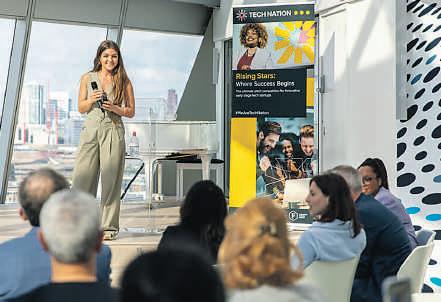
to surge to $1.89bn by 2028. “When you take into consideration that grief-related losses in productivity in the workforce cost an estimated $100bn each year in the US, I expect demand for bereavement care to grow even more as companies try to find ways to holistically support their employees and invest in solutions that will have a positive impact on their bottom line.”
Empathy will use its latest fundraising ($47m) to continue to enhance its platform, including building new offerings to meet individuals wherever they are in their grief journey.
“Taking a broader look at the
industry, we see massive potential for further change in the end-of-life sector,” says Gura.
“We’re already seeing this play out with our strong partner and customer base, and we expect to see more employers and life insurance carriers sign on to provide our services to their employees and beneficiaries.
“We also believe that we’re going to see a cultural and societal shift in how we show up for and care for those experiencing loss. Collectively, we have an opportunity to shake up bereavement care in the US and beyond.” empathy.com





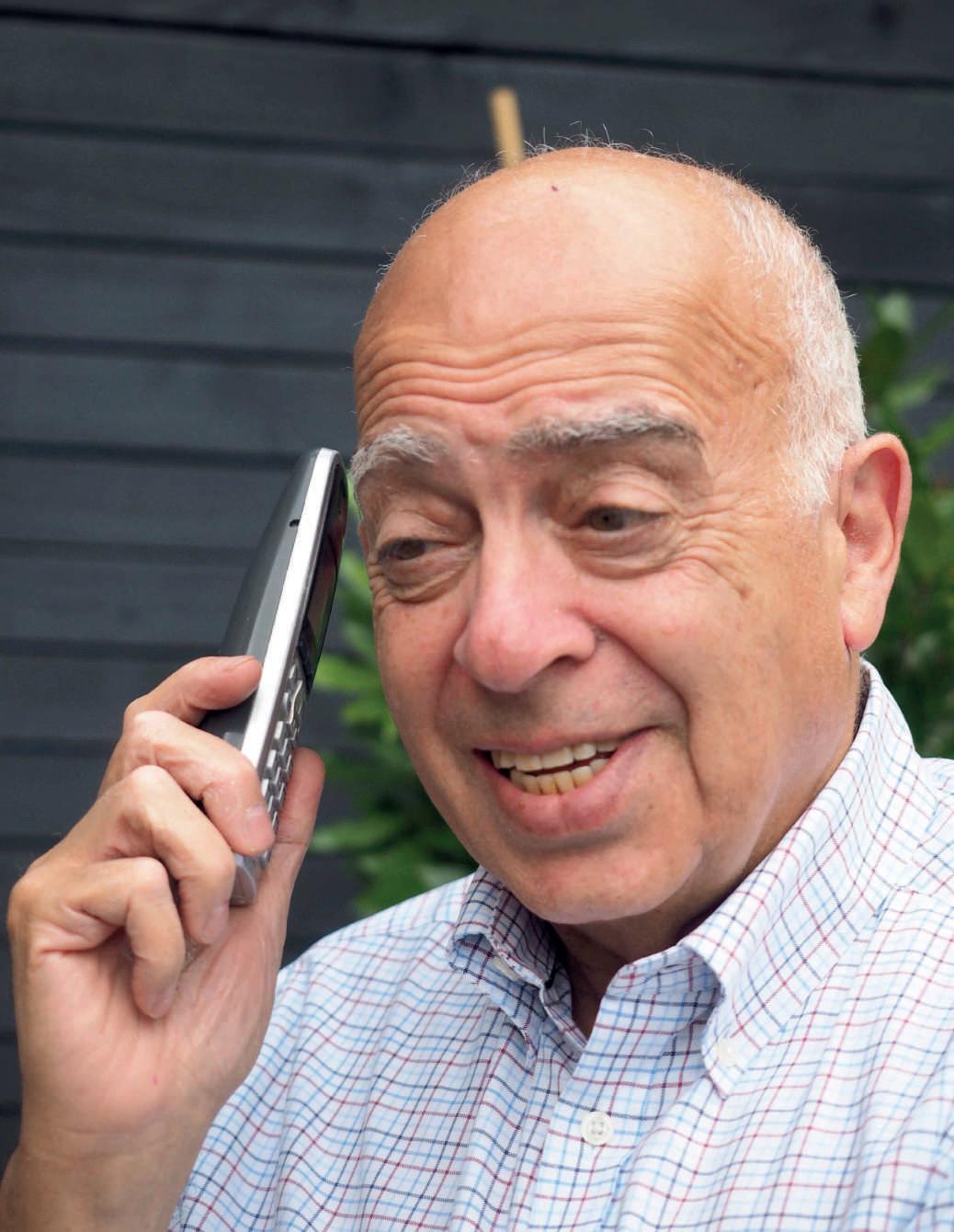
Struggling to hear the TV? Missing out on family phone chats?
Hearing just not what it used to be?
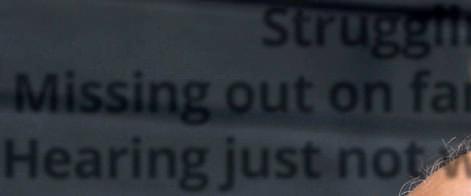






In our thought-provoking series, rabbis and educators relate the week’s parsha to the way we live todayBY SHIRA JACKSON UNITED SYNAGOGUE EDUCATOR
Every day we light the flame anew
Transition periods are incredibly dicult. We often reference periods of our life as those before or after a big event to give a context to our experiences. We describe the post-Holocaust era, reminisce about life pre-Covid and now we contextualise our Jewish identity and all it entails post-7 October.
Each chag that comes around forces us to ask ourselves some serious questions. How can we celebrate Pesach, the festival of freedom, when our people are not free? How do we frame Yom Ha’atzmaut when our right to exist has again been called into question? At Mount Sinai, God designates us to be “a kingdom of priests and a holy nation” (Exodus 19:6) but what does that mean for us as a nation on
Shavuot 3,336 years later? The Sforno (a 16th century commentator) explains this as both a mission and a promise: the mission to share God’s world view with the whole of humanity by teaching them Torah through our example, and the promise that we’ll be around forever to fulfil that mission.
This duality is reflected in parsha B’ha’alotecha this week, which begins with God instructing Aaron the Kohen Gadol (High Priest), to light the menorah. He had to do this same job, on repeat, every single day.
Interestingly, in the Temple, although all seven lamps of the menorah were filled with the same amount of oil, one light, the western light, would remain lit till the next day, so the Kohen could use it to relight the others.
This constant flame came to an end when Shimon Hatzadik (the Righteous) died. He led us through another di cult transition, as he marked the end of the era of the Men of the Great Assembly and the beginning of

the Mishnaic era, ensuring that the flame of Judaism would continue even after the second Temple was consumed by fire.
Why is there a miraculous ner tamid, constant light, as well as the need to relight daily? Being a part of the Jewish nation means recognising that our mission is to light the flame anew every day, while living through the miraculous promise from God that our flame will never be extinguished.
As Shavuot approached, I found myself thinking about my friend Maya, who was going through the process of converting to Judaism at this time of national crisis. When I asked her how that felt, her answer blew me away. “Your pain is my pain is our pain. Your hope is my hope is our hope,” she said. “After thousands of years, we’re still here; still standing, still growing and still thriving. During times of darkness, it is crucial to find light and to be light.”
It is the quintessential Jewish response

God pledged it would never be extinguished
in times of tragedy; to unite through our collective grief, grow through our shared aspirations, whilst o ering each other mutual support through that di cult transition. Maya completed her conversion in time to celebrate Shavuot and take on the responsibility, along with the rest of us, to be a light unto the nations (Isaiah 49:6).

 BY RABBI MIRIAM BERGER FINCHLEY REFORM SYNAGOGUE
BY RABBI MIRIAM BERGER FINCHLEY REFORM SYNAGOGUE
Hostages, hope and heroism
The rescue of four hostages by the IDF, while I led a Shabbat service at my synagogue was an act that will forever be engraved in my heart.
The iPad that I used during the pandemic is now routinely on the bimah so I can see the faces of those who are attending our services on Zoom. A message appeared on screen that Shabbat morning from the lay leader who expertly runs the technology for our services.
She was relaying the breaking news of the rescue so that I could share it with the community within minutes.
We added into our community prayers our gratitude for their homecoming and added extra fervour to our prayers for the release of all the other captives, fuelled by this newly restored hope.
As we sang Adon Olam to conclude the service, our screens, which usually display the faces of our Zoom community, temporarily relayed clips from social media of the hostages’ first embraces with their parents and the hordes on Tel Aviv’s beaches singing Am Yirael Chai
It felt a privilege to be able to share this important news as it happened. I had become convinced that the negotiations over hostages would only be to recover their bodies, so the vision of these living souls felt like mechayeh hameitim
(giving life to the dead). It was a message to never give up hope and a reminder of the meaning of faith.
Yet my hope turned to a brokenness when faced with the reality of the loss of o cer Arnon Zmora, who was critically wounded by Hamas fire amid the heroic rescue and later died of his wounds. Arnon – just like the rescued hostages Noa, Almog, Andrey and Shlomi – is someone’s child, someone’s friend.
Yet rather than being taken against his will by terrorists, he had actively placed himself in this dangerous situation as a commitment to the rescue and, even more so, to defend the Jewish homeland.
I have had the luxury, throughout my entire lifetime, to take Israel’s existence
A stimulating series where progressive rabbis consider how to navigate Judaism in the face of 21st-century issues
for granted. I have taken for granted the huge sacrifice of every parent in Israel, who brings their child up knowing that one day they will be the ones to ensure that the country is kept secure. Compulsory army service should not just be a mindset in Israel; it should be part of a deep, deep gratitude every diaspora Jew feels.
Hope alone is not enough; Israel needs people to act for its survival in the physical sense, and for the rest of us to show our gratitude for those who risk their lives.
In writing these words, my intention is not to undermine the equally strong desire for the IDF and elected leadership of Israel to operate only with the deepest of morality and with appreciation of the sanctity of all and every life.








–






We are still young as long as we have dreams and plans... Take a look at Osprey Court and Heathside, where Osprey has retirement flats available for the over 60’s. Located in North West London near Hampstead and Golders Hill Park Osprey’s properties are very well maintained, purpose built and designed to support you to live an independent life. Just dream about your interior design! Osprey’s communal facilities include lounge, guest suite, therapy room, beautiful gardens and lifts. There is also plenty of on-site parking.




















































































Our trusty team of advisers answers your questions about everything from law and finance to dating and dentistry.
This week: How to manage cashflow in a small business, tips for obtaining FCA authorisation and inheritance tax
 ADAM SHELLEY ACCOUNTANT SOBELL RHODES LLP
ADAM SHELLEY ACCOUNTANT SOBELL RHODES LLP
Dear Adam
I recently set up a small business and need support in managing cashflow effectively. Are you able to provide any guidance? Georgia
Dear Georgia
Managing cashflow is critical for the survival and growth of your business. It’s about planning, monitoring and controlling the money coming in and going out, to ensure you have enough cash to cover expenses and avoid insolvency. Staying updated with the latest tools and strategies is vital.
The first step is to understand when and how your income and expenses occur. Create

JACOB BERNSTEIN
FINANCIAL SERVICES (FCA COMPLIANCE)
RICHDALE CONSULTANTS LTD
Dear Jacob
My firm is seeking direct authorisation from the FCA. I heard that one in five firms get rejected. Can you tell me why so many get declined so I can prepare?
Michelle
Dear Michelle
The authorisation process has become more stringent
recently, primarily to prevent harm and improve conduct standards and culture in firms. Here are some reasons why firms get declined (or have the FCA suggest they ‘withdraw’):
1. Incomplete or poorquality applications. The FCA firms to show they are “ready, willing and organised” to operate from the day of authorisation.
2. Failure to meet threshold conditions. Often, firms apply before they are ready to satisfy the minimum FCA threshold conditions outlined in Part 4A of the Financial Services and Markets Act 2000. These include having appropriate resources and having appropriate systems and controls in place.
3. Failing to meet fit and proper criteria. The FCA
a forecast that includes all expected inflows (from sales, accounts receivable and so on) and outflows (such as operating expenses, inventory purchases and loan payments). This forecast should be updated regularly to reflect actual figures and revised projections.
Accelerating the inflow of cash is crucial. Do this by invoicing promptly, o ering payment incentives and streamlining processes.
Maintaining a cash reserve is a strategic safety net for your business, designed to shield against unforeseen dips. Determining its size involves analysing historical financial patterns and anticipating future needs.
By assessing your current financial status, you can create a plan to improve your cashflow. Additionally, insights can be provided into tax e ciencies to ensure you’re not overpaying, thereby improving overall financial health and enabling more informed decision-making for sustained growth. Need a
assesses senior management and key personnel to ensure they are of good repute. The firm must also demonstrate that management and sta have the required experience, qualifications and training to e ectively perform their roles.
4. Business model or conduct concerns. If the FCA believes a firm’s business model may lead to poor consumer outcomes or has concerns about the conduct and culture in the firm, the application might be denied.
5. Non-disclosure. Firms or their connected individuals, sometimes provide incorrect or incomplete information. The FCA takes nondisclosure or providing false information very seriously, and such actions often result in application refusal.
 CAROLYN ADDLEMAN DIRECTOR OF LEGACIES KKL EXECUTOR &
CAROLYN ADDLEMAN DIRECTOR OF LEGACIES KKL EXECUTOR &
Dear Carolyn
I have calculated the value of our assets exceeds the inheritance tax allowance, meaning that there will be an inheritance tax liability when my wife and I eventually die. Is there anything I can do to reduce the liability at this stage, so my children receive more of my estate?
Sophia



Dear Sophia
You don’t say how big your estate is or how old you are, but you mention that your assets exceed the nil rate band, the tax-free allowance of £325,000, which would trigger an inheritance tax liability of 40% on the remaining assets. The allowance is doubled to £650,000 if your estate is left to each other on first death and there were no lifetime gifts made in the seven years prior to death. For estates up to £2m there is an additional £350,000 per couple exemption where the family home passes to children or grandchildren, making the possible exemption £1m per couple. The exemption is reduced for estates exceeding the £2m bracket.
However, you can start to make lifetime gifts which will fall out of your estate after seven years, and you can give £3,000 a year to family or friends with no tax implications. Ensuring life policies and certain types of investment are held in trust is an e cient way of preserving assets, and gifting money or shares to charity is also neutral for inheritance tax. Finally, ensure your Wills are up to date and include a tax-free legacy to your favourite charities which is a win win for your children in tax saving and for the causes you want to support, particularly if you gift 10% of taxable assets which then triggers a lower rate of inheritance tax at 36% instead of 40%.
DONNA OBSTFELD
Qualifications:
• FCIPD Chartered HR Professional
• 25 years in HR and business management.
• Mediator, business coach, trainer, author and speaker
• Supporting businesses and charities with the hiring, managing, inspiring and firing of their staff
DOHR LTD 020 8088 8958
www.dohr.co.uk donna@dohr.co.uk

ADAM SHELLEY
Qualifications:
• FCCA chartered certified accountant
• Accounting, taxation and business advisory services
• Entrepreneurial business specialist including start-up businesses
• Specialises in social media influencers and sport sector including tax planning and financial management
• Maurice Wohl Charitable Foundation Volunteer of the Year JVN award
SOBELL RHODES LLP 020 8429 8800 www.sobellrhodes.co.uk a.shelley@sobellrhodes.co.uk

LISA WIMBORNE
Qualifications:
Able to draw on the charity’s 50 years of experience in enabling people with physical disabilities or impaired vision to live independently, including:
• The provision of specialist accommodation with 24/7 on-site support
• Knowledge of the innovations that empower people and the benefits available
• Understanding of the impact of a disability diagnosis
JEWISH BLIND & DISABLED 020 8371 6611 www.jbd.org Lisa@jbd.org

020

ILAN RUBINSTEIN
Qualifications:
• UK born, licenced Israel estate agent in Israel since 2001
• Ilan assists in buying, financing & re-sale of new & existing property in Israel.
• Helps level the playing field opposite vendors, developers & even the bank
• Attentive to your needs, saving you time, hassle & money

I.L.A.N. ESTATES & INVESTMENTS “Bringing Jews Home” UK: 0203-807-0878 ISRAEL: +972-504-910-604 www.ilanrealestate.com nadlan@hotmail.com
JONATHAN WILLIAMS
Qualifications:
• Jewellery manufacturer since 1980s
• Expert in the manufacture and supply of diamond jewellery, wedding rings and general jewellery
JACOB BERNSTEIN
Qualifications:
• A member of the APCC, specialising in financial services compliance for:
• Mortgage, protection and general insurance intermediaries;
• Lenders, credit brokers, debt counsellors and debt managers;
• Alternative Investment Fund managers;
• E-Money, payment services, PISP, AISP and grant-making charities.
RICHDALE CONSULTANTS LTD 020 7781 8019 www.richdale.co.uk jacob@richdale.co.uk

DR BEN LEVY
Qualifications:
• Doctor of psychology with 15 years’ experience in education and corporate sectors
• Uses robust, evidence-based methods to help you achieve your goals, whatever they may be
JEWELLERY CAVE LTD 020 8446 8538 www.jewellerycave.co.uk jonathan@jewellerycave.co.uk
CAROLYN ADDLEMAN
Qualifications:

• Specialist in supply of diamonds to the public at trade prices

OF LEGACIES
• Lawyer with over 20 years’ experience in will drafting and trust and estate administration. Last 14 years at KKL Executor and Trustee Company
• In close contact with clients to ensure all legal and pastoral needs are cared for
• Member of the Society of Trust and Estate Practitioners
KKL EXECUTOR AND TRUSTEE COMPANY 020 8732 6101 www.kkl.org.uk enquiries@kkl.org.uk
STEPHEN MORRIS
Qualifications:
• Managing director of Stephen Morris Shipping Ltd

• Works with clients individually to maximise success
MAKE IT HAPPEN 07779 619 597 www.makeit-happen.co.uk ben@makeit-happen.co.uk
SUE CIPIN OBE
Qualifications:
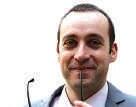
• 24 years+ hands-on experience, leading JDA in significant growth and development.
• Understanding of the impact of deafness on people, including children, at all stages
• Extensive services for people affected by hearing loss/tinnitus
• Technology room with expert advice on and facilities to try out the latest equipment.
• Hearing aid advice, support and maintenance
JEWISH DEAF ASSOCIATION 020 8446 0502 www.jdeaf.org.uk mail@jdeaf.org.uk

• 45 years’ experience in shipping household and personal effects
• Chosen mover for four royal families and three UK prime ministers
• Offering proven quality specialist advice for moving anyone across the world or round the corner
STEPHEN MORRIS SHIPPING LTD 020 8832 2222 www.shipsms.co.uk stephen@shipsms.co.uk
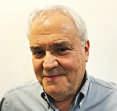




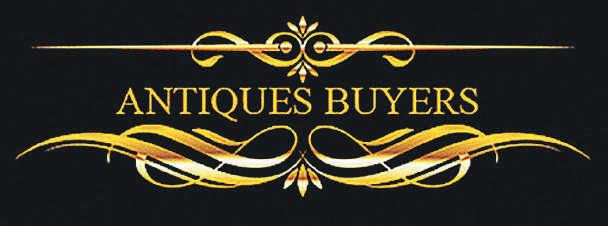



Wanted all Antiques & furniture including Lounge Dining and Bedroom Suites. Chests of drawers. Display and Cocktail Cabinets. Furniture by Hille. Epstein. Archie shine. G plan etc in Walnut. Mahogany. Teak and Rosewood.
We also buy Diamonds & Jewellery. Gold. Silverware. Paintings. Glass. Porcelain. Bronzes etc.
All Antiques considered. Full house clearances organised. Very high prices paid, free home visits.
Check our website for more details www.antiquesbuyers.co.uk
Email: info@antiquesbuyers.co.uk
Please call Sue Davis on Freephone: 08008402035 WhatsApp Mobile: 07956268290
Portobello Rd London. By appointments only. Please note rather than acting as agents for other organisations and charging you commission. Please be assured that in dealing with Antiques Buyers we deal directly with our clients and pay in full at the time of the transaction.
Antique – Reproduction – Retro Furniture (any condition)
Epstein, Archie Shine, Hille, G Plan, etc.
Dining Suites, Lounges Suites, Bookcases, Desks, Cabinets, Mirrors, Lights, etc. House clearances
Single items to complete homes
MARYLEBONE ANTIQUES - 8 CHURCH STREET NW8 8ED 07866 614 744 (ANYTIME) 0207 723 7415 (SHOP)
- e-mail -
@maryleboneantiques.co.uk
YOU CONTACT US BEFORE SELLING


Friendly Family Company established for 30 years
We clear houses, flats, sheds, garages etc. No job too big or too small! Rubbish cleared as part of a full clearance. We have a waste licence. We buy items including furniture bric a brac.
For a free quote please phone Dave on 07913405315 any time.
ADVERTISE IN THE UK’S BIGGEST JEWISH NEWSPAPER FOR LESS THAN £24 A WEEK
Email Sales today at sales@jewishnews.co.uk
Confidential Bereavement Counselling for adults and children individually. Support Groups available. We offer in person, online and telephone counselling. Contact Jewish Bereavement Counselling Service in confidence. 0208 951 3881 enquiries@jbcs.org.uk | www.jbcs.org.uk
MENTOR
Former “Magic Circle” solicitor offers help with:
• CVs and personal statements
• interviews and assessment days
• coping with stress and workload
• promotion and new opportunities
Sheltered Accommodation
We have an open waiting list in our friendly and comfortable warden assisted sheltered housing schemes in Ealing, East Finchley and Hendon. We provide 24-hour warden support, seven days a
and
For
and
or
For more information contact Tom lawmentor@btinternet.com / 07590 057097 LAW MENTOR

Former “Magic Circle” solicitor offers help with:
• CVs and personal statements
• interviews and assessment days
• coping with stress and workload
• promotion and new opportunities
For more information contact Tom lawmentor@btinternet.com / 07590 057097






11 Female rabbit (3)
12 Morally proper (7)
13 Blue Shoes, Presley song (5)
14 Culinary pulveriser (6)
16 Plus (2,4)
19 Farmland units (5)
21 Make more secure (7)
23 Try to win the affection of (3)
24 Sudden thrust (5)
25 Take away (7)
26 Tending flocks (11)
2 Dog’s restraining chain (5)
3 Appendix to a will (7)
4 Wax light with a wick (6)
5 ___ basket, wickerwork carrycot (5)
6 Bishop’s area (7)
7 Signal to take action (4-2,4)
10 Of clothes, reaching the middle of the leg (4-6)
15 Squash (7)
17 With vision (7)
18 Heavy uninteresting food (6)
20 Lottery (5)
Fill the grid with the numbers 1 to 9 so that each row, column and 3x3 block contains the numbers 1 to 9.
Fill the grid with the numbers 1 to 9 so that each row column and 3x3 block contains the numbers 1 to 9.
___ Kush, mountain range in Afghanistan (5)
22 Practise for a feat of endurance (5)
Thin glass bottle (5)
Each cell in an outlined block must contain a digit: a two-cell block contains the digits 1 and 2, a three-cell block contains the digits 1, 2 and 3; and so on. The same digit must not appear in neighbouring cells, not even diagonally.
Each cell in an outlined block must contain a digit: a two-cell block contains the digits 1 and 2 a three-cell block contains the digits 1 2 and 3; and so on. The same digit must not appear in neighbouring cells not even diagonally.
or
The items that might be stored in a loft can all be found in the grid. Words may run either forwards or backwards in a horizontal vertical or diagonal direction but always in a straight unbroken line.
In this finished crossword, every letter of the alphabet appears as a code number. All you have to do is crack the code and fill in the grid. Replacing the decoded numbers with their letters in the grid will help you to guess the identity of other letters. with
In this finished crossword every letter of the alphabet appears as a code number. All you have to do is crack the code and fill in the grid. Replacing the decoded numbers with their letters in the grid will help you to guess the identity of other letters.
Sudoku4
Since its founding in 2004, Masa has served more than 200,000 young professionals from over 60 countries, and its network continues to grow. Make this year stand out and see where your Masa can take you.
Masa Israel Journey is more than just a physical journey to Israel. It’s an opportunity to explore oneself in new surroundings while gaining a transformative experience.
Masa offers life-changing, long-term opportunities, 2-10 months for fellows between the ages of 16 - 40 in Israel, that allows fellows to shape their own futures.
Masa fosters an environment where fellows are encouraged to strive towards their personal and professional destinations both during and after their programme in Israel.
For more information visit www.masaisrael.org masa@ujia.org

